The story of the IRIE MAFFIA
symphonic concert

Location
- Margaret Island’s Open-Air Theater
More Info
JÁVORI FEGYA and the BUDAPEST KLEZMER BAND
“My life in Klezmer tunes”
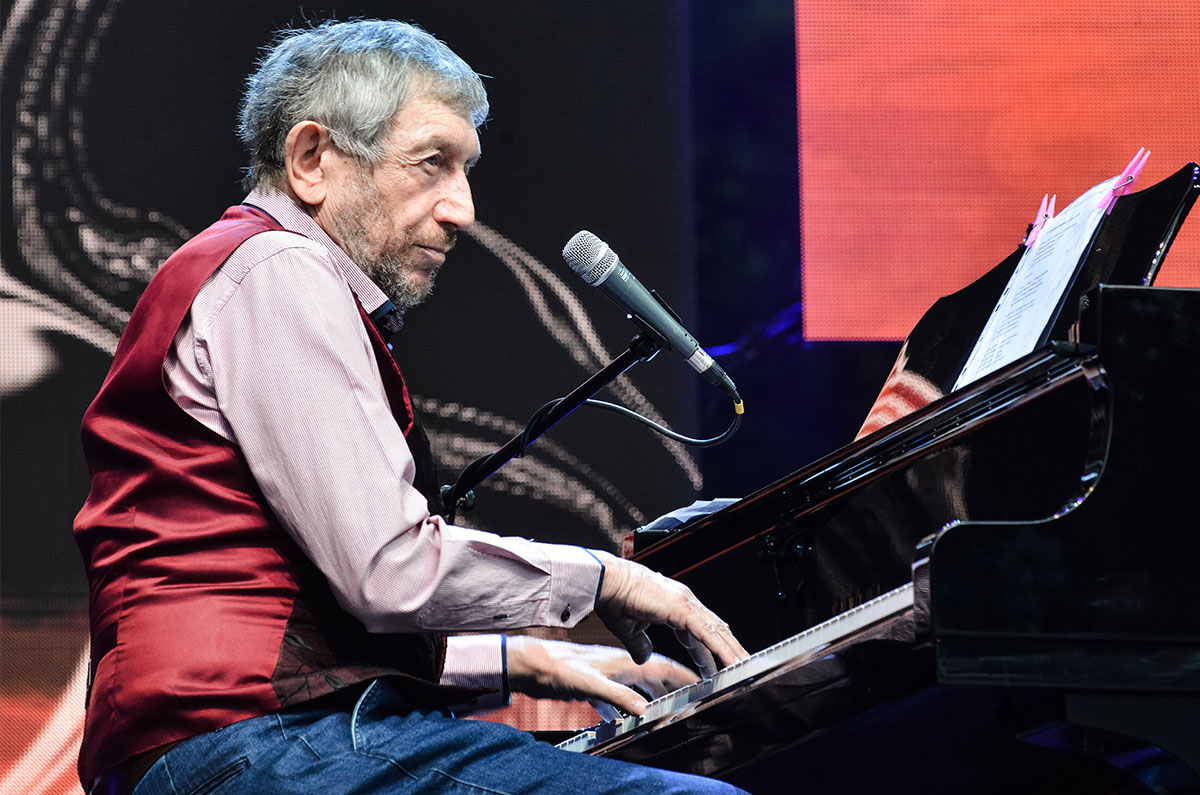
Location
- Margaret Island’s Open-Air Theater
More Info
MAGASHEGYI UNDERGROUND
symphonic remix concert

MAGASHEGYI UNDERGROUND
symphonic remix concert

Location
- Margaret Island’s Open-Air Theater
More Info
Filled with new creative energies and updated songs and new transcripts, the Magashegyi Underground Orchestra, led by Bíborka Bocskor, will arrive on the patinated stage of Margaret Island to show their latest songs in a symphonic version.
National Philharmonic Orchestra and Gergely Bogányi – piano
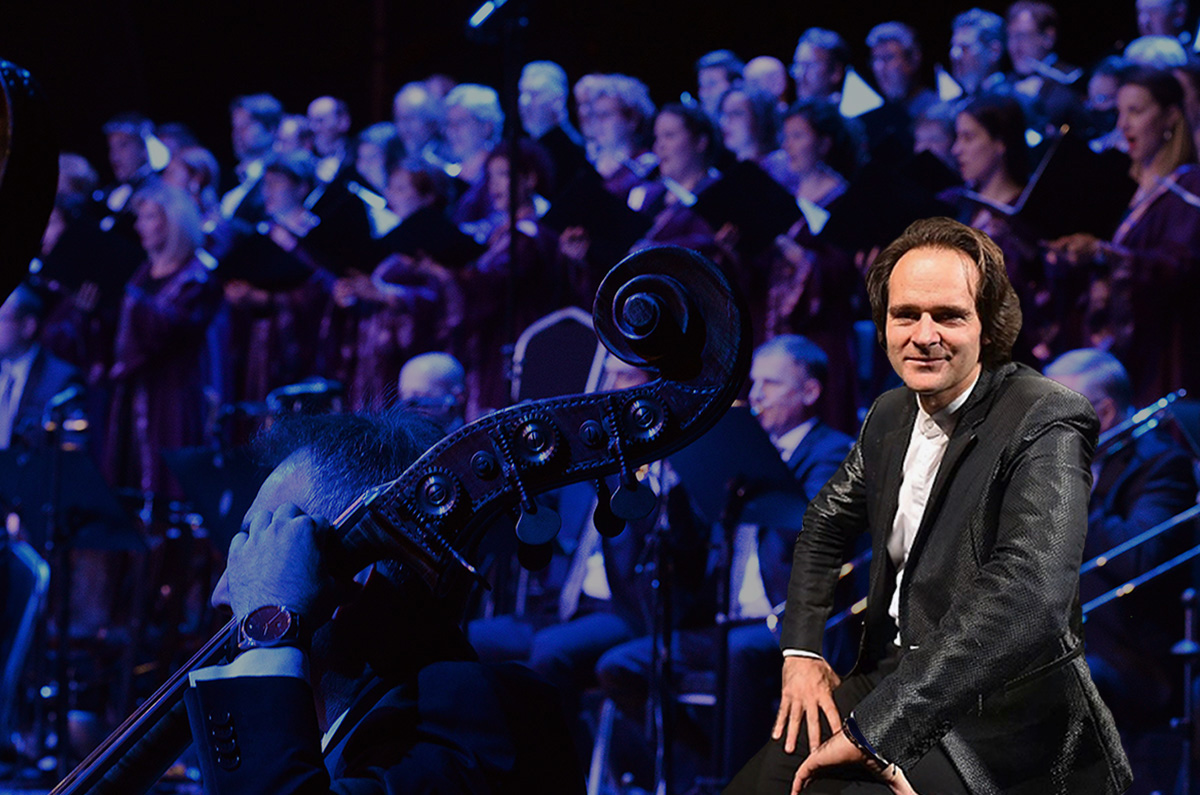
Location
- Margaret Island’s Open-Air Theater
More Info
-
Description
-
Gergely Bogányi
-
The piano
-
Program schedule
-
Domonkos Héja
-
The Hungarian National Philharmonic Orchestra
Opening concert
National Philharmonic Orchestra
Gergely Bogányi - piano
3 June 2022 at 8 p.m.
Margaret Island Open-Air Stage
Every year, the National Philharmonic Orchestra performs regularly at the Margaret Island Open-Air Stage. This concert by Hungary's most prestigious symphony orchestra is an important part of the summer season, and this year's concert promises to bring together artists and performers with a fervent and timeless spirit.
The highlight of the evening will be the Hungarian pianist Gergely Bogányi playing on his special piano construction with the world's first Carbon Core center plate.
On this occasion, he will perform Frédéric Chopin ‘s piano concerto No. 2 in F minor, Op. 21,
The Hungarian master is represented this evening by his symphonic poem “Les Préludes”. The virtuoso lived a tempestuous life, and this work, conceived in a vein of true romanticism, erupts with enormous energy. It has become a well-deserved favorite with the music-conscious public.
The other mainstay of the program opening the summer season is Antonín Dvořák's New World Symphony. Like the Hungarian master, Dvořák spent a long period away from his homeland. Never forgetting his roots, he used elements of Czech folklore throughout his works. His Ninth “New World” Symphony was composed in New York for a competition at the National Conservatory of Music, where he was the jury president. The composition, which proved to be a timeless piece, unsurprisingly won first prize. The movements of this large-scale American-born work evoke the modern big city and traditional Indian and Czech folklore. This work is a fitting end to our opening concert, as it expresses the mission of our theatre: "To cherish our native treasures and to be open to the world, because culture unites."
Gergely Bogányi was born in Vác in 1974, and began playing piano in his hometown at the age of 4. He studied at the Franz Liszt Academy of Music and the Sibelius Academy in Helsinki, before completing his education at Indiana University in Bloomington under László Baranyay, Zsuzsa Esztó, Matti Raekallio and György Sebők. He has placed in numerous music competitions, and was the winner of the 1996 International Franz Liszt Piano Competition in Budapest. In 1999, the Bogányi-Kelemen Trio (Barnabás Kelemen - violin, Tibor Bogányi - cello, Gergely Bogányi - piano) came first in the international trio competition in Kuhmo, Finland.
Today, Gergely Bogányi is one of the most popular artists in concert halls around the world. His repertoire includes over 30 piano concertos and a significant portion of the piano literature, including all of Chopin's solo piano compositions. In 2002, in a series of recitals in Finland and Hungary, he performed Liszt's 12 Transcendental Études and all of Chopin's solo piano pieces, winning the Gramofon Award for the year's best concert series. In 2000, he was awarded the Liszt Prize, and the President of Finland awarded him the Grand Cross of the White Rose of Finland in 2002. Ferenc Mádl, former President of the Hungarian Republic, presented him with the Kossuth Prize in 2004, then in 2008, he was recognised with the Junior Prima Award, and in 2011 with the Prima Award.
In 2016 he was named a Citizen of Honour of the capital of Hungary, Budapest. In 2010 he performed all the compositions of Frédéric Chopin at Palace of Arts, Budapest.
In 2015 his revolutionary, futuristic concert grand piano has been unveiled at the Liszt Ferenc Music Academy, in Budapest. Since then his Grand Piano had been challenged at the most prestigious concert halls around the world from New York, Carnegie Hall and Lincoln Center Koch Theatre until Moscow, Tchaikovsky Conservatory with huge success.
In 2017 Mr. Bogányi was invited by the Royalty of Saudi Arabia to give the very first classical concerts on his revolutionary Grand Piano in the capital of Saudi Arabia, Ryiadh and in Jeddah.
Les préludes by Ferenc Liszt
("Preludes" or "The Beginnings"), S.97, is the third of Franz Liszt's thirteen symphonic poems.
Piano Concerto No. 2 in F minor, Op. 21, by Frédéric Chopin
The Symphony No. 9 in E minor, "From the New World", by Antonín Dvořák
Domonkos Héja was born in Budapest, grew up in a family of musicians and played the piano, viola and drums. In 1998 he successfully completed the courses in conducting and percussion at the Franz Liszt Academy of Music in Budapest. In the same year he won first prize at the 9th International Conducting Competition of Hungarian Television and shortly thereafter other prizes at the Mitropoulos Conducting Competition in Athens.

In 1993 Héja founded the Danubia Orchestra, of which he was musical director until 2013. As the most promi sing Hungarian conductor he received the Liszt Prize in 2003 and the Junior Prima Prize in 2008. Héja made his debut at the Hungarian State Opera in 2001 with Puccini's »La Bohème«. From 2005 to 2012 he was 1. Kapellmeister at the Theater Chemnitz, from 2011 to 2013 general music director of the Hungarian State Opera, with which he is still closely connected as a guest conductor. In addition he guested i.a. with the MDR Symphony Orchestra, DSO Berlin, Taipei Symphony Orchestra, Tokyo City Philharmonic Orchestra, the Mecklenburg State Orchestra, Philharmonic Orchestra Freiburg, Presidential Symphony Orchestra Ankara and the leading Hungarian orchestras.
In addition to concerts, contemporary music and operas Domonko's Héja repertoire also includes oratorios and sacred works as well as the most important symphonies, ballets, operettas and musicals. One focus is on the music of Hungarian composers from Franz Liszt to Ernö Dohnányi and György Ligeti.
Since the beginning of the 2015/16 season, Domonkos Héja has been general music director at the Staatstheater Augsburg. He conducted i.a. Alexander Zemlinsky's »Der König Kandaules«, Dimitri Shostakovich's »Lady Macbeth von Mzensk«, Carl Maria von Weber's »Der Freischütz«, Giuseppe Verdi's »La forza del destino«, Charles Gounods »Werther« und »Faust«, Gaetano Donizettis »Don Pasquale«, Richard Strauss’ »Ariadne auf Naxos«, und Benjamin Brittens »Peter Grimes«.
The Hungarian National Philharmonic Orchestra has been one of Hungary’s leading symphony orchestras for over ninety years.
The era marked by the name of János Ferencsik and Kobayashi Ken-Ichiro was followed by a new chapter in the history of the orchestra when in 1997 Zoltán Kocsis became general music director. In almost two decades the orchestra underwent renewal and – with versatility befitting a national symphony orchestra – it performs not only classical pieces, but also numerous other important works previously missing from the repertoire, including Hungarian music of the recent past and our days, and popular chamber music concerts and events for young people. The Hungarian National Philharmonic Orchestra has performed the works of Richard Strauss, Debussy, Schoenberg, Ravel and Rachmaninov in some ambitious, void-filling projects, and importantly it also promotes the cause of 20th and 21st-century contemporary Hungarian music.
Despite its size, the orchestra actually functions more like a chamber orchestra in terms of the sensitivity with which its members listen to, and work in tandem with, one another. The musicians are allowed to shine, yet still share responsibility for the collective. They also share the aim of achieving and delivering the highest level of quality at every performance, an ambition that goes far beyond simply playing all the notes perfectly.
After the death of Zoltán Kocsis, the Ferenc Liszt Award-winning Zsolt Hamar held the post of Musical Director at the Hungarian National Philharmonic from March 2017 to August 2020. He previously worked with the orchestra as its first permanent conductor and built up an impressive international career.
The oeuvre of Bartók features prominently in the repertoire of the Hungarian National Philharmonic Orchestra, with many authoritative interpretations recorded in the Bartók New CD Series. Its subscription concerts feature world-famous guest soloists and conductors, as well as highly gifted young Hungarian musicians. The orchestra has appeared in the greatest venues and festivals around the world, including Avery Fisher Hall in New York, Suntory Hall in Tokyo, Birmingham’s Symphony Hall, the Megaron in Athens, the Bozar Centre in Brussels, Francfort’s Alte Oper, the Enescu Festival in Romania, as well as the Colmar and Canary Islands Festivals. In the past 15 years the orchestra has given over 350 concerts in some 40 countries, and is a returning guest in France, Japan, Germany, Romania, Spain, Slovakia and Slovenia.
Day of National Unity
CARAMEL – The Music of Joy
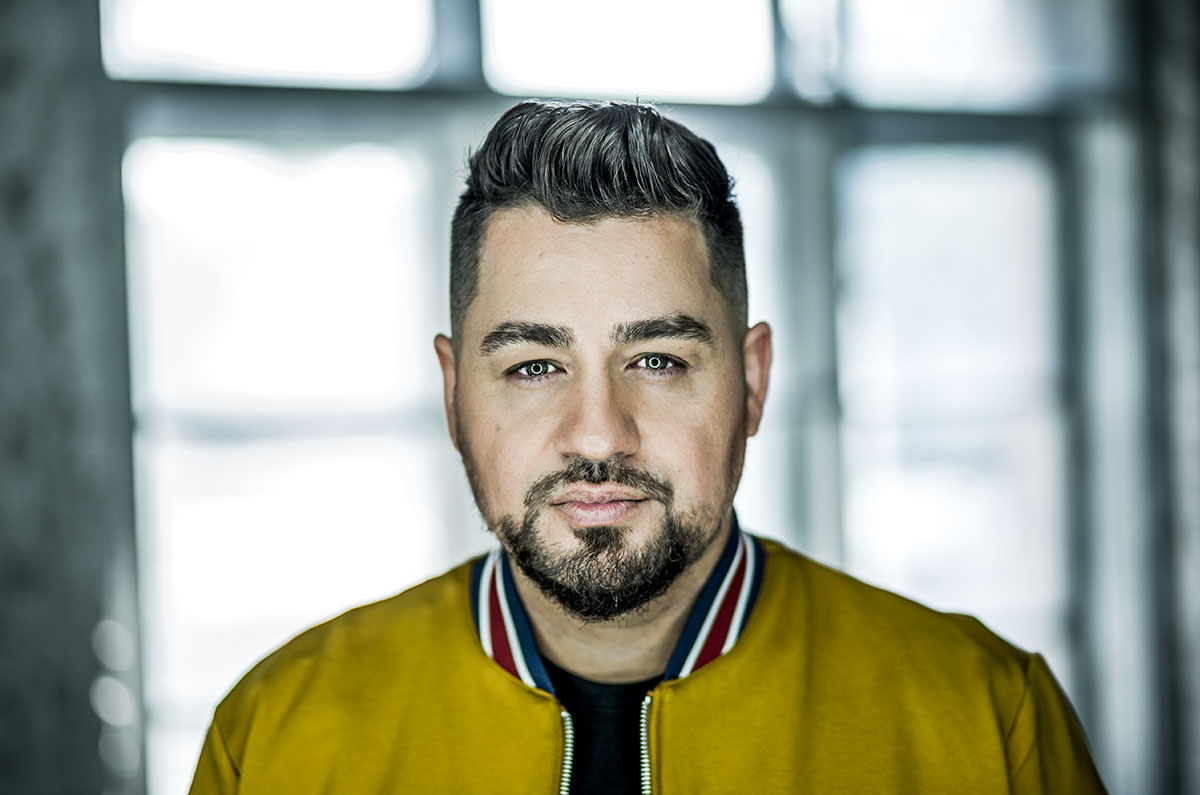
Location
- Margaret Island’s Open-Air Theater
More Info
Year after year, Caramel’s production provides a heartfelt, touching and cathartic experience for the audience, who reward with standing applause. In 2022, on the Day of Togetherness, Caramel awaits the audience with a similarly stunning yet renewed production, complete with new songs and new musical elements.
László Tolcsvay – Péter Müller – Péter Sziámi Müller:
THE GOSPEL OF MARY
rock opera
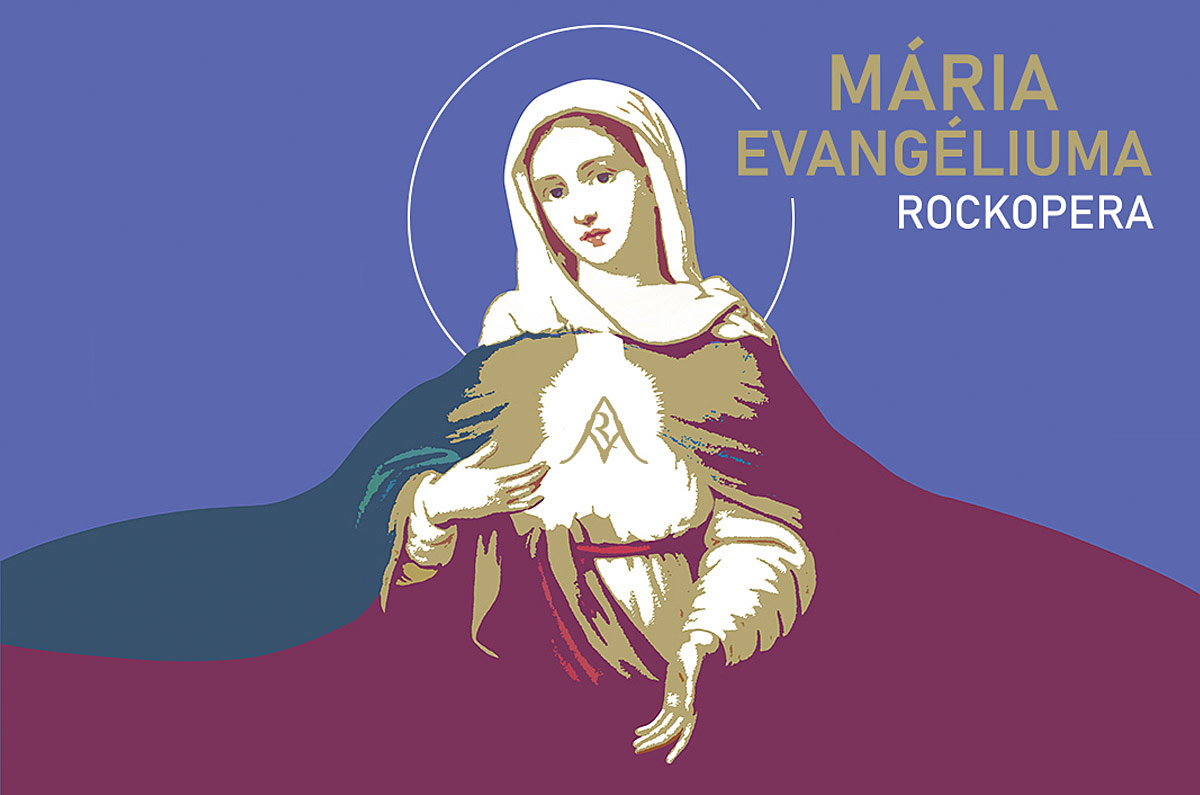
Location
- Margaret Island’s Open-Air Theater
More Info
The Gospel of Mary rock opera was presented at the Madách Theater 30 years ago, and since then it tells the story of the Virgin Mary, a recurring hit on the domestic, cross-border and European music stages. From her youth through the birth and crucifixion of Christ to the Assumption of Mary, we can follow the events in the visionary interpretation of the Apostle John.
SAINT EPHRAIM MALE CHOIR
Special guest star:
VICTOR SOLOMON

Location
- Margaret Island’s Open-Air Theater
More Info
-
Description
-
SAINT EPHRAIM MALE CHOIR
-
Victor Solomon
SAINT EPHRAIM MALE CHOIR
Special guest star: VICTOR SOLOMON
20th anniversary gala
more than 400 performers and guests on the stage
11 July 2022 at 8 p.m. (rain date: 12 July)
Margaret Island Open-Air Stage
Hungary's most popular vocal ensemble was started 20 years ago by Liszt Prize-winner and Artist of Merit, Tamás Bubnó. The multi-award-winning Szent Efrém Male Choir has successfully performed on four continents and in more than 30 countries around the world over its two-decade career. Whether they are singing deep-toned Orthodox music, medieval hymns, playful Bartók works, pounding Liszt anthems or world hits, they never fail to impress audiences with their mature sound and strong stage presence.
"The St. Ephraim Singing Ensemble will celebrate the biggest bang of their anniversary in 2022 with the Grand Gala on Margaret Island. They have been preparing all year long in order to bring the audience joy and pleasure and to conquer more and more people with the magic of singing. Their mission is to bring about the miracle of music and singing, spirit and intellect, manifest in the human body and voice!" declared Tedóra Bán, artistic director of Margaret Island Open-Air Theatre.
The 20th anniversary marks a truly epic choral gala on Margaret Island Open Air Stage! The ensemble will perform together with choruses that have managed to establish a significant artistic collaboration with them in recent years – all made even more colorful and festive by the symphonic orchestral accompaniment and special visual effect. The concert is set to be a dizzying musical journey from early medieval to gospel and modern hits, with arrangements written exclusively for the occasion.
The Lautitia Family Chorus, the Budapest School of Singing, the Várpalota Schola, the Premontrei Schola of Gödöllő, the Belvárosi Kántorátus, the Angelica Girls Choir, the Heuréka Pop Orchestra, and Swing á la Django will all perform. A total of four hundred singers will celebrate together with this outstanding vocal ensemble. Such a large-scale celebration in Hungary is possible only on Budapest’s Margaret Island. To showcase the ensemble's diverse repertoire, spanning the ages and styles of the world, the magnificent Victor Solomon, the magical-voiced gospel singer and finalist of The Voice 2021, will arrive from America with his ensemble to celebrate with the St. Ephrem Male Choir.
The ensemble and the Margaret Island Theatre team are preparing a truly cathartic experience. Through the experience of lifting their voices together, they will conquer and captivate the audience to the delight of all.
The entire Margaret Island will dissolve into one vast choral sound!
SAINT EPHRAIM MALE CHOIR
Introduction
In modern times, classical music has become an outdated genre that is closely associated with aristocracy. Saint Ephraim Male Choir wishes to tear down this stigma.
Our view is that there are two archetypes of music; the sacred and the profane, and we believe that classical values are inherent in both, regardless of its genre or age. Whether we perform deep tonal orthodox music, felxible Mediterranean Byzantine melodies, playful Bartók pieces, powerful Liszt hymns or popular modern music hits, our main goal is to offer quality in performance! IIt is not enough for us to enjoy singing our choice of music, we strive to make it enjoyable for our audiences as well. Saint Ephraim Male Choir is an intellectual hub, where we are constantly inspired by each other’s personalities, musical talents and vibrancy. We believe that good music is not meant to be understood – but it is meant to be enjoyed.
Short intro
Hungary’s most popular chamber vocal ensemble was established in 2002 by Tamás Bubnó, Hungarian Artist of Merit and Liszt Award laureate. The choir’s name comes from Saint Ephraim the Syrian (306-373), who was a celebrated hymn composer, aptly nicknamed “harp of the Holy Spirit’ by his contemporaries.
In the beginning, the choir specialised in performing the abundant musical heritage of Byzantine Christian music, which had also paved the group’s initial success within and across borders. The curiosity towards Hungary’s male choir heritage had also been a strong vein, inspired by the Greek Catholic Priest, János Boksay’s male choral liturgy. Once heading down this track, came the raking up of Franz Liszt’s forgotten male choir pieces followed by Béla Bartók’s sensational compositions. Thus, alongside maintaining the Byzantine musical heritage, the 2nd main pillar of the choir’s profile grew to nurture the male choral music of Hungary’s grand masters.
Having performed in various prestigious local as well as international festivals and concert venues, Saint Ephraim Male Choir’s unique sound became familiar to numerous contemporary composers, some of whom have written pieces specifically for the group. It has become their mission to perform contemporary music at all their concerts.
The permanent group of 8 singers perform regularly in Hungary and internationally as well as hosting an annual concert series named Orientale Lumen, where internationally renowned guests are also invited to contribute. They released 14 albums. Some of the members are aspiring composers themselves, often composing and rearranging pieces to expand the choir’s unique repertoire.
Milestones
- 2002 – foundation of St Ephraim Male Choir
- 2005 – János Boksay’s Liturgy for Male Choir is recorded and released
- 2006-2010 – international festival appearances and prizes (St Petersburg Summer Festival, Moscow; Hajnówka Music Festival, Poland; Ravenna Festival; Janacek May; Dvorák Festival; Schleswig-Holstein Musik Festival; Donaufest-Ulm; MusikFestspiele Saar; Festival de Royaumont; Festival d’Auvers sur Oise)
- 2011 – Orientale lumen series begins
- 2012 – ’Cities’ series begins in Budapest Music Center
- 2013 – Rachmaninov’s All-Night Vigil at the Budapest Spring Festival
- 2014 – From One to Twelve – series commemorating Miklós Ybl
- 2015 – Bartók&Folk CD released
- 2016 – Joint concert with the King’s Singers (MüPa, Budapest)
- 2017 - Aldeburgh Festival, Artrium Contemporary Music Festival
- 2018 – Liszt Mosaics dance performance
- 2019 – Wings CD release, sold-out concert at the Liszt Music Academy
- 2020 – quarantine videos going viral – Pandémia, Türkisch
- 2021 – Bartók&Folk premiere
 Victor Solomon competed on Season 20 of NBC’s The Voice where he was a finalist on Team John Legend. Victor plans to pursue his career in music and later on create his own label. Victor is also looking forward to an amazing year of new opportunities, traveling out of the country for bookings, and releasing new music. About his journey on the show ahead of the finale, Solomon spoke to reporters saying "For them to see me on this show and follow my dreams, it's really just a testimony that they can do it too. Whatever dreams or aspirations that you have, you can make it. If you keep God first, everything will fall in line."
Victor Solomon competed on Season 20 of NBC’s The Voice where he was a finalist on Team John Legend. Victor plans to pursue his career in music and later on create his own label. Victor is also looking forward to an amazing year of new opportunities, traveling out of the country for bookings, and releasing new music. About his journey on the show ahead of the finale, Solomon spoke to reporters saying "For them to see me on this show and follow my dreams, it's really just a testimony that they can do it too. Whatever dreams or aspirations that you have, you can make it. If you keep God first, everything will fall in line."
Victor and his three siblings were raised by a single mom. He remembers times when they went without electricity and water, but they were a tight-knit family and always got through the difficult times together.
Victor started singing in church at six years old and won his eighth-grade talent show by singing John Legend's "Ordinary People." He continued singing in school and attended North Carolina A&T State University, the country's largest historically Black university. He performed in the school's 2020 virtual graduation ceremony, singing And I Will Rise Up.
Victor is now a senior and was voted Mister of his university. He serves on the Student Government Association Executive Board and stays busy with his Mister duties, but he continues to sing at church and in the school's gospel choir.
KŐSZÍVŰ
The Baradlay legend
musical

Location
- Margaret Island’s Open-Air Theater
More Info
One of the summer’s most exciting premieres will be the musical “Stonehearted – the Baradlay Legend,” dreamed up by Vajk Szente. One of the most important and well-known stories in Hungarian history, after the novel and the film, this time it will be presented on the Grand Stage of Margaret Island!
KŐSZÍVŰ
The Baradlay legend
musical

Location
- Margaret Island’s Open-Air Theater
More Info
One of the summer’s most exciting premieres will be the musical “Stonehearted – the Baradlay Legend,” dreamed up by Vajk Szente. One of the most important and well-known stories in Hungarian history, after the novel and the film, this time it will be presented on the Grand Stage of Margaret Island!
MOZART!
Musical by Michael Kunze and Sylvester Levay

Location
- Margaret Island’s Open-Air Theater
More Info
The Mozart! musical (a co-production with the Petőfi Theater of Veszprém) is nourished by authentic literary materials and correspondence, it is a work of a distinctive teaching nature, the outstanding value of which for us is that the author is presented with the special permission of Sylvester Levay, a hungarian composer.
MOZART! Musical by Michael Kunze and Sylvester Levay

Location
- Margaret Island’s Open-Air Theater
More Info
The Mozart! musical (a co-production with the Petőfi Theater of Veszprém) is nourished by authentic literary materials and correspondence, it is a work of a distinctive teaching nature, the outstanding value of which for us is that the author is presented with the special permission of Sylvester Levay, a hungarian composer.
Ballet of the Slovenian National Theatre Maribor: Carmina Burana and The Rite of Spring
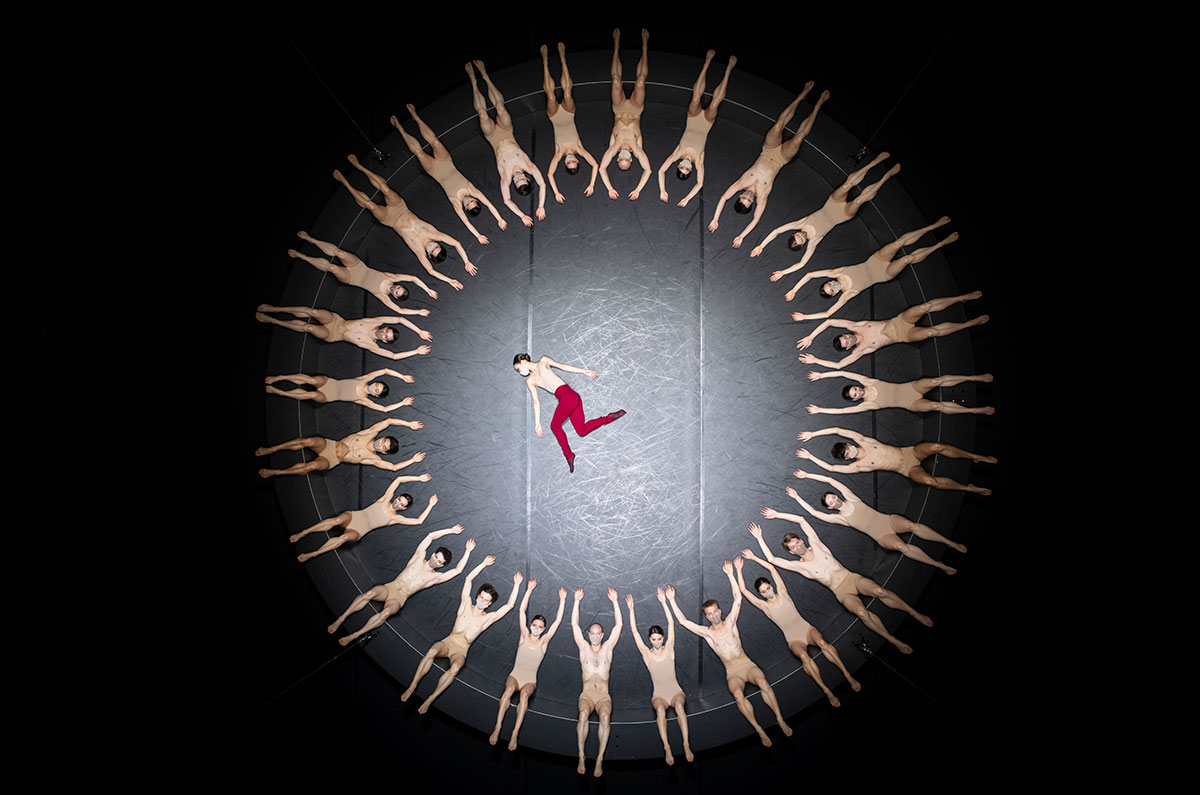
Location
- Margaret Island’s Open-Air Theater
More Info
-
Description
-
Carmina Burana
-
Edward Clug
-
The Rite of Spring
-
Tamás Darai
-
Evgenija Koškina
-
Asami Nakashima
Ballet of the Slovenian National Theatre Maribor:
Carmina Burana and The Rite of Spring
Choreograph: Edward Clug
1July 2022 at 8 p.m. (rain date: 2 July)
Margaret Island Open-Air Stage
You can enjoy two cult pieces in one evening with the charismatic dancers of the Ballet Ensemble of the Slovenian National Theater in Maribor in a modern adaptation by the Romanian choreographer Edward Clug.
The dance project offers plenty of breath-taking images in the scenography of Marko Japlj.
The driving force of choreography for Carmina Burana, following the content of various texts from the medieval manuscript Codex Buranus, is the parallelism between the cycles of nature, especially during the spring awakening of nature, and human life and lust. It is the awakening of lust in the young body, which longs for the forbidden and unattainable (fruit), that represents the movement tension of the journey through twenty-four "songs". The shape that spontaneously emerged was a circle that coincided with the circle of happiness from the first song of O Fortuna and was created by thirty dancers, each striving for the core of this perfect natural form. The narrower the circle, the more tension and force permeates its core.
“Orff's stage cantata is undoubtedly still an extremely popular work today, in which I sought mainly spontaneous movement impulses that would address the viewer during the unfolding of the musical flow and unobtrusively include him in this constantly revolving circle of life.
With the uncertain future of theatrical life, I only want visitors to see the play live as soon as possible, because it is the spectators who close our circle, we need them so that our world can come to life again in a common theatrical experience.” Edward Clug
Carmina Burana
Choreography: Edward Clug
Music : Carl Orff
Set: Marko Japelj
Costume: Leo Kulaš
Lighting design: Tomaž Premzl
Assistants to the choreographer: Matjaž Marin, Sergiu Moga
The show lasts 1 hour and has no break.
Premiere: May 16, 2021
dance spectacle
SYNOPSIS
Edward Clug revisits a fundamentally humanizing 20th century work with the power to bring people together, Carl Orff’s Carmina Burana, inspired by medieval verse. The work’s introduction, O Fortuna, evokes the World's destiny while Man is powerless in facing its uncertain future.
Firmly anchored in modernity choreographer Edward Clug reflects, first, the implicit torment of Carmina Burana, but more importantly springtime, hope and love, central themes in the work, which touches human beings in their most visceral dimension, that of their legacy, and longevity.
From the choreographer's notebook:
At the initiative of Ivan Cavallari, artistic director of the Grand Canadian Ballet in Montreal (Les Grands Ballets Canadiens de Montréal), the idea of choreographing the famous stage cantata Carmina Burana by Carl Orff seemed at first absurd, probably due to prejudice. I had them about the nature of Orff’s music. However, upon closer examination of the musical record, my prejudices proved unfounded, so I am still grateful for that experience today. The biggest challenge was to find personal meaning, personal story within Orff's monumental work, and to avoid duplicating what text and music alone "confess" in a way.
The driving force of choreography, following the content of various texts from the medieval manuscript Codex Buranus, is the parallelism between the cycles of nature, especially during the spring awakening of nature, and human life and lust. It is the awakening of lust in the young body, which longs for the forbidden and unattainable (fruit), that represents the movement tension of the journey through twenty-four "songs". The shape that spontaneously emerged was a circle that coincided with the circle of happiness from the first song of O Fortuna and was created by thirty dancers, each striving for the core of this perfect natural form. The narrower the circle, the more tension and force permeates its core.
Symbolically kneaded, Orff's stage cantata is undoubtedly still an extremely popular work today, in which I sought mainly spontaneous movement impulses that would address the viewer during the unfolding of the musical flow and unobtrusively include him in this constantly revolving circle of life. Especially in these times of great challenges and personal patience, he revived and was reborn through a shared theatrical experience. Orff's own setting of a variety of songs offers virtually countless interpretations of the existential question of what happiness, life and love really are, none of which are wrong - but certainly no interpretation is the only correct and universal one.
The dance project offers plenty of breath-taking images in the scenography of Marko Japlj. With the uncertain future of theatrical life, I only want visitors to see the play live as soon as possible, because it is the spectators who close our circle, we need them so that our world can come to life again in a common theatrical experience.
Edward Clug

When enrolling at the National ballet school in Cluj-Napoca (Romania) in 1983, the child of 10 years of age saw a way out from the repressive dictatorship of Ceausescu. After very harsh years during schooling, the communist regime collapses in 1989. Two years after in 1991 he completed his studies, and in September of the same year, he tried his chance at the Slovene National Theatre in Maribor, where he got his first engagement and started his career when Slovenia made its first steps as a newborn country after exiting Yugoslavia.
Here he met famous Slovene theatre director Tomaž Pandur, with whom he started to collaborate as a dancer in his avant-garde productions. Noticing his creative potential Pandur asked him to create the choreography for the performance Babylon, which premiered in 1996.
After his first choreographic experience, Clug embarks on a new artistic journey and in 1998 he creates his first independent project Tango, together with costume designer Leo Kulaš and set designer Marko Japelj, who became his constant creative team. Later in 2008 composer Milko Lazar joins the team in the project Prêt-à-porter and they continue to collaborate intensively ever since.
In 2003 the newly appointed general director of SNT, Danilo Rošker assigned him as artistic director of the ballet and Clug starts to lead the company towards new and distinctive directions. In 2005, he created Radio & Juliet on the music of Radiohead, which became an international hit and drew the international attention due to his specific choreographic style. He started to collaborate with other ballet companies around the world and equally succeeded in putting the Maribor Ballet ensemble on the international dancing map. The Ballet of the SNG Maribor participated in the largest theatre festivals throughout the world performing his choreographies: Jacob's Pillow Dance Festival (USA), The Stars of the White Nights Festival in Mariinsky theatre St. Petersburg, Festival of Firsts in Pittsburgh, Arts Festival in Singapore, Biarritz Festival in France, O Botiçario di danza in Brazil, Dance Festival in Tel Aviv, Sintra Festival in Portugal, Festival Des Arts de Saint-Sauveur (Canada), Seoul International Dance Festival (Korea), at the Milan Teatro Piccolo, Dance Open Festival in St. Petersburg and toured Netherlands, Italy, and the countries of former Yugoslavia.
Throughout the years, Clug has developed a strong relation with prestigious Stuttgart Ballet and Zurich Ballet, where he created in 2018 the much-acclaimed full-length ballet Faust.
In the last years, he also started a successful collaboration with the Netherlands Dance Theatre where he created several projects for NDT (I & II). The most recent one Aperture for NDT I, received rave reactions from both critics and public. He was also invited to create new works for Bolshoi Ballet Moscow, Royal Ballet of Flanders, Vienna State Ballet, National Ballet in Lisbon, Grand Ballets Canadiens Montréal, Station Zuid Company, Croatian National Ballet in Zagreb, Croatian National Ballet in Rijeka, National Ballet in Bucharest, Aalto Ballett Essen, Bitef Dance Company Belgrade, Graz Tanz, Ukrainian National Ballet Kiev, Staatsballett am Gärtnerplatz Munich, Augsburg Ballet, Hessisches Staatsballett Wiesbaden, West Australian Ballet in Perth, Novosibirsk State Ballet and Dortmund Ballet. In 2021 he will create a full-length ballet for Bolshoi Ballet, based on Bulgakov’s masterpiece The Master and Margarita. Premiere will take place on 1st of December.
He received several national and international awards for his work and was nominated for the Golden Mask award in 2010 for the project Quattro. He was distinguished with the highest Slovene prizes in culture, the Prešern Foundation Award in 2005 and the Glazer Charter in 2008. He was nominated in 2017 for the prestigious award "Benois de la danse” for the piece Handman with Nederland’s Dance Theatre II and in 2019 for the German Theatre Prize "Der Faust” for the piece Patterns in ¾ with Stuttgart Ballet.
Considered one of the most famous pieces of classical music (scenic cantatas), Carmina Burana by the German composer Carl Orff (1895–1982) was written in 1936 during the Naci rise to power, even though the Third Reich labelled Orff's work as degenerate music (Entartetete Musik). With Carmina Burana – in a manner similar to that previously employed by Richard Wagner with his idea of a total, comprehensive artwork (Gesamtkunstwerk) – Orff subscribed to the dramatic concept of "Theatrum Mundi" – the Great Theatre of the World in which music, movement and speech are closely and virtually inextricably intertwined. In following this artistic formula, Orff consequently modified the musical flow to the extent where music as a sonic phenomenon can receive its full expression only in a dramatic context, an intention which modern performances of Carmina Burana in purely concert form are generally unable to accomplish.
With this complex work, whose full Latin title reads Carmina Burana: Cantiones profanae cantoribus et choris cantandae comitantibus instrumentis atque imaginibus magicis (Songs of Beuern: Secular songs for singers and choruses to be sung together with instruments and magical images), Orff created a unique scenic work with a specific dramaturgy based on a selection of twenty-four poems from the preserved medieval manuscript of 254 poems written by travelling students in secular Latin, Middle High German and Old French between the 11th and 13th centuries.
The dramaturgy focuses primarily on sequencing individual episodes, which vary significantly in terms of both content and character, and not so much on progressively structuring a musical whole (in the strictly classical sense). It is thus only natural that in Carmina Burana Orff consciously avoids excessively complex harmonies in favor of the immediate effect of the sung text, an effect frequently manifested in the emotionally charged moments and unusually high vocal registers of all three solo parts (e.g., the tenor aria Olim lacus colueram, the "falsetto" aria for baritone Dies, nox et omnia and the aria for soprano Dulcissime).
Carmina Burana is part of Trionfi, a musical triptych that also includes Catulli Carmina (Songs of Catullus) and Trionfo di Afrodite (Triumph of Aphrodite). Orff was influenced melodically by the relatively simple but dramatically effective late Renaissance and early Baroque models, especially the madrigals by William Byrd and Claudio Monteverdi. Orff’s shimmering orchestration, which does not fail to incorporate pompous dramatic moments, including the opening movement O Fortuna, velut luna statu variabilis (O Fortune, like the moon you are changeable), is strongly reminiscent of Stravinsky's earlier work, Les noces (The Wedding) – that takes rhythm as its main musical element. Rhythm is also vital in determining the entry point at which Edward Clug, in his signature artistic style, embarks on his inspiring choreographic exploration of the medieval mysteries of life and different perspectives on life, which even in the proverbially "dark" Middle Ages were often very liberal and actually indistinguishable from modern hedonism.
Clug’s core visual element, expanded to reach a meaningful choreographic dimension, is the circle. As a geometric figure, the circle is nature’s simplest and most perfect creation (stars and planets are spherical in shape, heavenly bodies move in a circular or elliptical orbit). The circle also symbolizes ontological perfection and cyclical nature of existence, i.e., the perpetual transition from life to death and vice versa, as evidenced by the many alchemical symbols and emblems in both Eastern and Western esoteric traditions. The circle, whose center constitutes the principle of gnosis (knowledge, insight), acts as the dancers’ point of initiation, the primum mobile of a dance (and thus also social) collective that takes the viewer through various stages of life, energy states and psychic archetypes against the backdrop of Orff's continuous musical stimulus.
An evolution of the life course – pointedly outlined by the forces of recoil and attraction – finds its reflection on stage through Clug's masterful expressive vocabulary. In creating new rituals of life (and gradually symbolically separating a couple as the new civilizational "primogenitors"), the choreographer allegorically underscores this evolution with a sung invocation of the texts from the famous medieval manuscript, thus creating all the conditions – through a synthesis of music, verbal and dance arts – for a deep and intense spiritual experience of life.
Le Sacre du printemps
Choreographer: Edward Clug
Premiere: 13 April 2012
Modern (neoclassical) ballet co-produced with the Maribor 2012 - European Capital of Culture
The project Hommage à Stravinsky is an artistic tribute of Maribor Ballet to Igor Stravinsky, honoring the 130th anniversary of the composer's birth by reviving his work and making it aesthetically accessible to a wider audience. Additionally, the project will gain on its importance on the account of the centennial of the world premiere of Le sacre du printemps (The Rite of Spring), which was celebrated around the globe in the year 2013.
Edward Clug [ … ] has achieved the near impossible: a new and meaningful interpretation of Stravinsky's Le Sacre du Printemps.
Maggie Foyer, Dance Europe_________________________
Le Sacre du printemps
Music Igor Stravinski
A Note by author and choreographer Edward Clug:
"The Rite of Spring is undoubtedly a masterpiece of cult proportions of the 20th century. It does not just represent a turnabout within Stravinsky’s music poetics, but also in history of music. Furthermore, the entire evolution of the 20th century dance performativity reflects in The Rite, starting with Nijinsky’s staged choreography to Pina Bausch’s unique creativity. The original Nijinsky’s production represents an initiation of my own choreography, in respect of its hermeticism and "disturbing" avantgardism character at that time. My interpretation of The Rite could also be perceived as a personal tribute to Nijinsky and the infamous (lack of) "success" of the world premiere in Paris, which has indeed become a dynamic platform of development for modern dance in the 20th century.
This interpretation of The Rite follows the original libretto and music texture, which both depict a legend from pagan (pre-Christian) Russia. The legend conveys a story about ritual sacrifice of a (virgin) maiden, who has to dance to death, in order to restore fertility of the Earth, and regain the benevolence of the pagan spring deity. In the iconographic aspect, the performance employs the ethnographic symbols of the ancient Russian legend, i.e. women with long braid of hair and rosy cheeks, and men with full-grown beards – both being sex symbols, transposed into the contemporary world – in which everything is prepared for the new consecration of spring."
Cast
Set Design Marko Japelj
Costume Designer Leo Kulaš
Lighting Designer Tomaž Premzl
Assistant to Choreographer Matjaž Marin
Sound Technician Gregor Mendaš
Stage Manager Peter Krajnc

Tamás Darai was born in Budapest, Hungary. He studied at the Hungarian Dance Academy (BA) and particip
ated in competitions in Lausanne, Istanbul and Beijing, and in summer intensives in North Carolina and Houston.
Tamás joined the Ballet of the Croatian National Theatre in Zagreb in 2012 under the direction of Irena Pasaric, where he became a first soloist. He left the company to join Ballett Augsburg in 2015.
He danced in choreographies by William Forsythe, Nacho Duato, Marco Goecke, Hans van Manen, Uwe Scholtz, Valentina Turcu and Cayetano Soto, among others, and worked on creations with Pascal
Touzeau, Edward Clug, Dominique Dumais, Leo Mujic, Mauro de Candia, Ronald Savkovic and Riccardo De Nigris. His title roles were Franz in Coppelia, Prince in Nutcracker, Vronsky in Anna Karenina, Don Jose in Carmen, and Faust.
He joined the Dresden Frankfurt Dance Company in June 2017. There he worked and created with Jacopo Godani and learned his method of contemporary movement. Tamás danced in many of Godani’s pieces such as High Breed, Moto Perpetuo, Echoes from a Restless Soul, Metamorphers, Post Genoma and he was involved in the creation of Extinction of a Minor Species, Unit in Reaction, Al di La, From Now On, Ultimatum, Alter Ego, Stormo, Satelliting. He also did improvis
ation-based artistic installations with the company in Senckenberg Naturmuseum in Frankfurt, in the Frankfurter Kunstverein and in the Museum of Contemporary Art in Belgrade. Tamás performed with the company in theaters such as Teatro Real in Madrid, Stanislavsky Theater in Moscow, Tel Aviv Opera and they performed in festivals in Montpellier, Reggio Emilia, Barcelona, Sevilla, Zaragoza, Kuopio, Winterthur and Ludwigsburg.
He performed in galas as a guest artist in Japan, Spain, Germany and Croatia.
Since 2020 he is a freelance artist. He started to teach workshops and give ballet classes, and in 2021 became a Master’s Degree student at the Hungarian Dance Academy.

Ukrainian-born ballet dancer Evgenija Koškina completed her ballet training at the State Ballet in Kiev, where she started at the Academic Youth Theatre. In 2002, she joined the ballet ensemble SNG Maribor, where she has danced many important roles to this day. She participated in several ballet competitions in Vienna, where she twice qualified for the finals, and won a gold plaque at the 8th Competition of Young Slovenian Ballet Dancers in 2006 in Maribor. She has demonstrated her staggering technical and artistic qualities in solo ballet performances, both in the ballets of the classical ballet repertoire and in contemporary ballet choreographies. Her most prominent performances include solo roles from ballets such as Cinderella, La Bayadère, The Nutcracker, Swan Lake, Sleeping Beauty, Giselle, Romeo and Juliet and Don Quixote. She has also danced in contemporary ballet creations of the most prominent choreographers such as Alexander Ekman (Left Right Left Right), Jiří Kylián (Falling Angels), Johan Inger (Walking Mad), Mauro Bigonzetti (Cantata) and Edward Clug (Carmina Burana, Hill Harper's Dream, Stabat Mater, Tango, Architecture of Silence, Watching Others, Prêt-à-porter, Peer Gynt, The Rite of Spring, etc.).
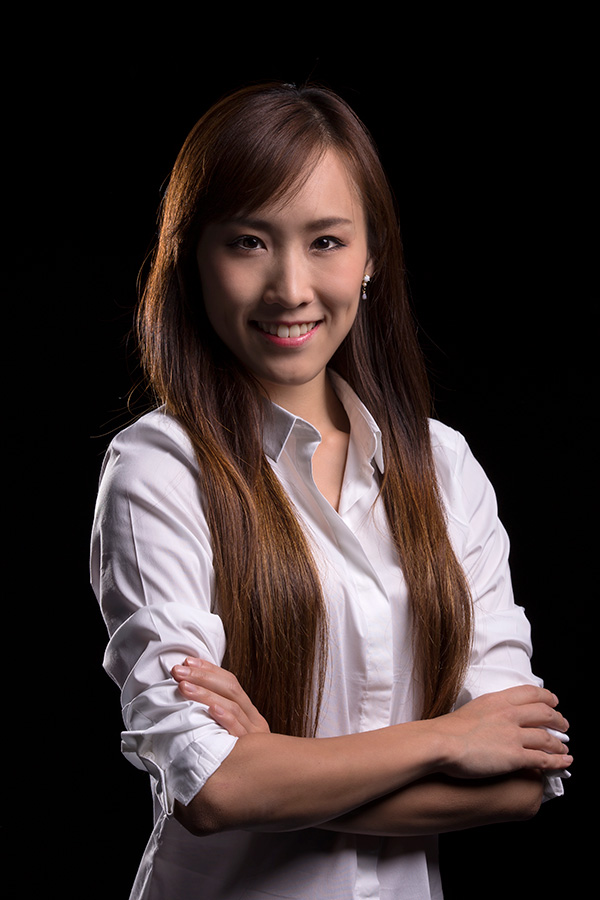
Asami Nakashima was born in Osaka, Japan. She started training in her hometown at the age of six. In 2008 she came to the Vienna State Opera Ballet School where she graduated in 2010. She joined the Slovene National Theatre Maribor in 2011. Her repertoire includes the leading roles in ballets such as Kitri (Don Quixote), Medora and Gulnare (Le corsaire), Clara and Sugarplum (Nutcracker), Sylph (La Sylphide). In addition, she has danced works by Alexander Ekman, Jiří Kylián, Johan Inger, Mauro Bigonzetti, Edward Clug (Carmina Burana, Hill Harper’s Dream, Stabat Mater, Tango, Watching Others, Prêt-à-porter, Peer Gynt (Anitra, Solveig, Ingrid), The Rite Of Spring.)
She has received several honors and prizes including the bronze medal at the 27th Varna International Ballet Competition in 2016, gold medal at the Rudolf Nureyev International Ballet Competition in 2019 and a special prize awarded by the Slovene Ballet Artists Association in 2011 and in 2017.
She has performed at the galas in Japan, Latvia, Bosnia and Herzegovina and Slovenia.
BUDAPEST GYPSY SYMPHONY ORCHESTRA
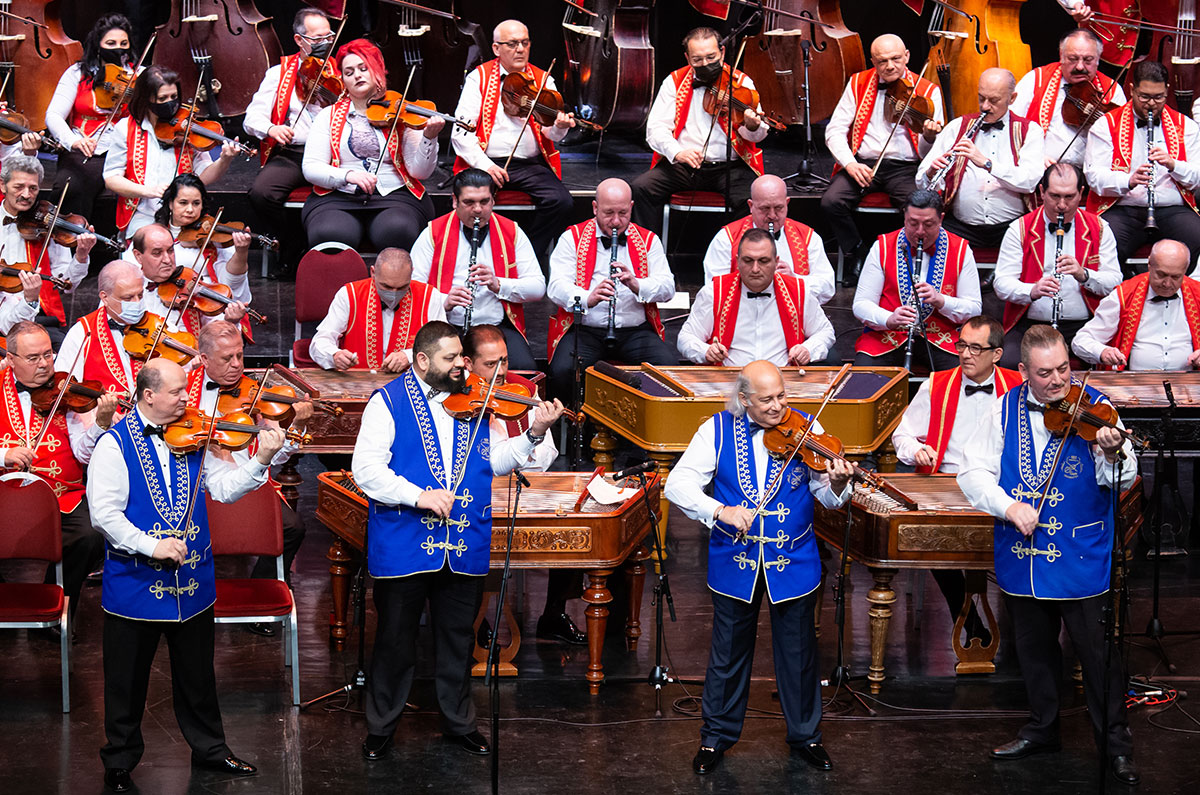
Location
- Margaret Island’s Open-Air Theater
More Info
The Budapest Gypsy Symphony Orchestra will commemorate the 35th anniversary of its formation, dedicated to its Roma prima violinist founder László Berki, on Margaret Island’s imposing stage.
Giacomo Puccini:
TOSCA opera
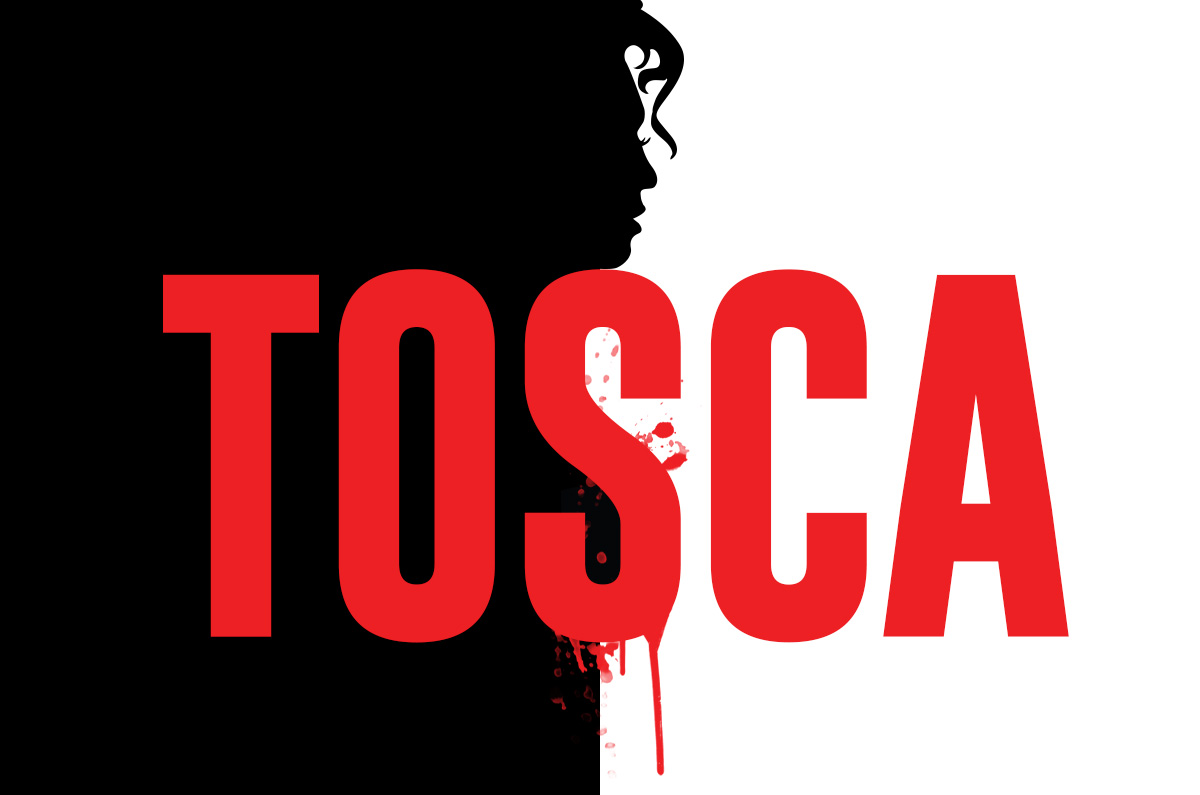
Location
- Margaret Island’s Open-Air Theater
More Info
-
Description
-
Cast
-
Synopsis
-
Francesco Meli
Giacomo Puccini:
TOSCA
Opera in three acts, in Italian, with Hungarian and English surtitles
8 July 2022 at 8 p.m. (rain date: 9 July)
Margaret Island Open-Air Stage
One of the most beautiful and captivating works in the history of opera, Tosca is a gripping and exciting work about love, struggle, and jealousy. For the audience, it is a cathartic experience borne by the singers’ passion. For the singers, it is the fulfillment of their artistry. Every character is a dream role for the world’s greatest stars, demanding perfect singing and acting.
At the heart of the story is a woman who sacrifices herself for her love, avenging the injustices and lies she has suffered. It shows how the power of love can help a woman stay true to herself and what she believes in above all else. The "Letter Aria" and "Vissi d'arte" have become the greatest hits of opera literature. The work premiered in Rome, bringing Puccini national and international fame. Within a few years, it was performed in 60 cities around the world, and it remains a staple of the modern repertoire. In Hungary, it has been performed continuously at the Opera House since 1903.
The 2022 production of Tosca on the Margaret Island Open-Air Stage promises to be a real treat, featuring the world-famous tenor Francesco Meli as Cavaradossi. This star of La Scala, the Metropolitan Opera, and Covent Garden will be making his first appearance in Budapest. As Tosca, Eszter Sümegi, one of the most skilled performers of the role, will appear. Mihály Kálmándy can be heard as Scarpia.
Conductor: Gergely Kesselyák
Featuring the Hungarian State Opera House’s orchestra and chorus
Librettist: Giuseppe Giacosa Luigi Illica
Director: Viktor Nagy
Set designer: Tamás Vayer
Costume designer: Nelly Vágó
English surtitles: Arthur Roger Crane
Head of the Children's Chorus: Nikolett Hajzer
Chorus director: Gábor Csiki
Floria Tosca: Eszter Sümegi
Mario Cavaradossi: Francesco Meli
Scarpia: Mihály Kálmándy
Cesare Angelotti: Marcell Bakonyi
Sacristan: András Hábetler
Sciarrone: János Szerekován
Spoletta: András Káldi Kiss
Act I
Angelotti, the former Consul of the Republic of Rome, has escaped from the state prison at the Castle St. Angelo and sought refuge in the church of St. Andrea della Valle, where his sister, the Countess Attavanti, has deposited the key to a hiding place. Angelotti conceals himself when the Sacristan arrives. The latter, outraged, finds that the painter Cavaradossi has given the altar painting on which he is working - a figure of Mary Magdalena - the features of a beautiful unknown woman who has often been observed at prayer in the church recently. While Cavaradossi admits that the stranger has, unknowingly, served as a model for him, his heart belongs only to bis beloved, the singer Floria Tosca, who closely resembles her. When the verger leaves, Angelotti comes out from his hidingplace, believing that he is now alone. He recognizes his friend Cavaradossi, who is prepared to assist him. So that no one shall find him with the fugitive, the painter locks the chapel door.
Then Tosca appears and the locked door arouses her jealousy, but Cavaradossi pacifies her and they arrange to meet that evening. However, Tosca's jealousy is reawakened when she recognizes in Cavaradossi's picture the Countess Attavanti. Once more the painter succeeds in convincing her of his faithfulness. She has hardly left the church when a cannon is fired, showing that Angelotti's escape has been discovered. Speed is now essential and Cavaradossi decides to hide the fugitive in a well in the garden of his house. When the Sacristan enters the church with the news that the Italian and Austrian forces have defeated Napoleon, Cavaradossi has disappeared. Exulting over the victory, the Sacristan prepares the choirboys for the Te Deum.
The joyous confusion is brought to a sudden halt by the arrival of Scarpia, the much-feared Chief of police, who, with his benchmen, is in pursuit of Angelotti. A fan of countess Attavanti found in the chapel, shows him that he is on the right track. Scarpia also discovers Attavantis features in Cavaradossi's painting and when Tosca now returns to tell the painter that she has to sing at the victory celebration being staged by the Queen, Scarpia inflames her jealousy in order to discover what she knows and urges Spoletta and his men to follow her.
Act II
It is evening and Scarpia is awaiting the arrival of Tosca, while on the floor below the Queen's celebrations are beginning. Spoletta appears, but without the fugitive Angelotti. Instead he has arrested Cavaradossi, but Scarpia is unable to wring a confession from him. When Tosca enters the room the painter warns her not to betray anything. Scarpia orders that the painter be tortured in an adjoining room. Anguished by the cries of her lover, Tosca betrays Angelotti's hiding place. The torture ceases. But when Cavaradossi hears that Napoleon, and not the Italian and Austrian forces, has won the day he passionately avows bis political ideals. Scarpia has him taken away and explains to Tosca, whom he holds back, that this confession has finally sealed Cavaradossi's fate. Tosca begs for her lover's life and, in the end, Scarpia promises that he will only pretend to have Cavaradossi shot if she gives herself to him. In utter despair, Tosca agrees. But as Scarpia writes out the pass that will give her and Cavaradossi their freedom she takes a knife from the table and kills him.
Act III
At dawn preparations are being made at the Castle St. Angelo for Cavaradossi's execution. The painter succeeds in obtaining pencil and paper from a guard in order to write Tosca a farewell note. Memories overwhelm him. Then Tosca herself appears before him and relates what has happened. She tells him that the execution will be a pretense. The execution squad appears. They fire and Cavaradossi falls dead. Tosca, in hopeless despair, realizes that Scarpia has tricked her and hurls herself from the battlements.

Francesco Meli is one of the most fascinating and sought-after tenors in the world.
He was born in Genoa in 1980 and began his singing studies at the age of seventeen at the Conservatorio Paganini, continuing with Vittorio Terranova and going on to gain recognition at several competitions for opera singers, including the Caruso, the Zandonai and the Tosti competitions.
In 2002 he debuted in Macbeth, the Petite Messe Solennelle and in Puccini’s Messa di gloria at the Festival dei Due Mondi in Spoleto. This marked the start of an outstanding career performing a repertoire of Bel canto and Rossini.
He made his debut at La Scala at the age of just 23 in Les Dialogues des Carmelites conducted by Maestro Riccardo Muti and has returned there over the years to perform in Otello, Idomeneo, Don Giovanni, Maria Stuarda and Der Rosenkavalier. To date, Francesco Meli’s name has appeared on eighteen playbills at Milan’s La Scala. In 2004 he made his debut as Nemorino in Elisir d’amore, a role which he went on to sing in numerous theatres. Since 2005 he has opened the Carlo Felice opera season in Don Giovanni and the Rossini Opera Festival season with a new production of Bianca e Falliero and has sung in Il Barbiere di Siviglia in Zurich, Don Giovanni at the Théatre des Champs-Elysées in Paris, La Sonnambula in Lyon for a Virgin recording with Natalie Dessay, in Così fan tutte under conductor Riccardo Muti in Vienna, where he returned to perform in a new production of Anna Bolena, in Maometto II at the Rossini Opera Festival and in Tokyo, again in Pesaro in Torvaldo e Dorliska for the opening of the 2006 Festival and as the Duke of Mantua in his debuts at the Royal Opera House and at the Metropolitan Opera.
Since 2009 he has gradually turned his attention from Bel canto roles towards dramatic opera: following performances in I Lombardi alla Prima Crociata, Simon Boccanegra and Werther in Parma, he debuted in the major Verdi roles and in 2013, the 200th anniversary of Verdi’s birth, he sang in Simon Boccanegra, I due Foscari, Ernani and in Nabucco at the Rome Opera and in Salzburg under conductor Riccardo Muti, Ernani at the New York Metropolitan, Macbeth conducted by Muti in Chicago, Simon Boccanegra in Vienna and at Teatro La Fenice, Un ballo in maschera in Parma, Rome, the Arena in Verona and La Fenice, il Trovatore at La Fenice and in new productions in Salzburg, Covent Garden, Amsterdam and Monte Carlo, I due Foscari in Los Angeles, Covent Garden and at La Scala, Giovanna d’Arco in Salzburg and at La Scala to inaugurate the season, Don Carlo at La Scala, Aida at the Salzburg Festival conducted by Riccardo Muti and in new productions of Carmen in Madrid and Covent Garden. He has on three occasions inaugurated the season at La Scala and he sang at the opening concerts for the Turin Olympics and for EXPO 2015 in Milan, both broadcast by RAI.
Francesco Meli has a repertoire of over fifty roles and has performed under the world’s most eminent conductors, working regularly with Riccardo Chailly, Myung-Whun Chung, Fabio Luisi, Riccardo Muti, Gianandrea Noseda, Antonio Pappano, Daniele Rustioni and Yuri Temirkanov.
He has performed in solo recitals at La Scala and in London, Tokyo and St. Petersburg and in the Verdi Requiem with Riccardo Chailly, Daniele Gatti, Fabio Luisi, Riccardo Muti, Lorin Maazel, Gianandrea Noseda and Yuri Temirkanov at La Scala and in London, Paris, Zurich, Moscow, Salzburg, St. Petersburg, Tokyo and Vienna. In 2019, during the Easter Festival at Baden-Baden, he performed for the first time with the Berliner Philharmoniker, again singing in the Verdi Requiem conducted by Muti.
Besides the Verdi Requiem, his concert repertoire includes the Requiems by Mozart, Donizetti, Dvořák and Andrew Lloyd Webber, Rossini’s Petite Messe Solennelle and Stabat Mater, Messe di Gloria by Puccini and Mascagni, Verdi’s Hymn of the Nations, Dvořák’s Stabat Mater and Pulcinella by Stravinsky. Amongst chamber music pieces, he has a particular affinity with Romances by Tosti and Respighi but also Bellini, Donizetti, Verdi, Duparc and Ravel. He has recorded Seven Sonnets of Michelangelo by Britten and Three Sonnets of Petrarca by Liszt (Opus Arte).
In 2013 he won the Abbiati Award for his performances of Verdi, and has also won the Maschera d’oro, the “Opera Star” International Opera Award, the Zenatello Award at the Arena in Verona, the Orazio Tosi Award, the Carlo Alberto Cappelli Award, the Pertile Award, the Lugo Award, the Prandelli Award, the Mascagni Award, the Tiberini d’oro Award, the ISO d’oro, the Labò Award and the Pavarotti d’oro.
Since February 2020 he has been Ambassador for the Renata Tebaldi museum in Busseto.
His recordings are available on a range of DVDs released by Deutsche Grammophon, Unitel and Opus Arte.
His most recent engagements include Simon Boccanegra in London, Genoa and Vienna, Ernani and La Traviata at La Scala, the Verdi Requiem conducted by Riccardo Muti in Tokyo, Baden-Baden and at the Salzburg Festival, Aida at La Fenice and in a concert performance in Chicago with the Chicago Symphony Orchestra conducted by Muti. The 2019/2020 season includes the Verdi Opera Gala in Piacenza, Giovanna d’Arco in a concert at La Monnaie, Ernani in concerts in Lyon, Paris and Vichy and the Verdi Requiem with Muti conducting the Chicago Symphony Orchestra at the Musikverein in Vienna. He inaugurated the current season at La Scala singing as Cavaradossi in Tosca, conducted by Riccardo Chailly and directed by Davide Livermore. When on February 23rd 2020 La Scala closed as a result of coronavirus, he was engaged in Il Trovatore, another of his signature roles, in which he was due to celebrate his 50th performance in February.
He resumed concert activity in summer 2020 with a concert performance of Un Ballo in maschera at the Maggio Musicale Fiorentino, in concerts with piano accompaniment at the Teatro Municipale in Piacenza, La Scala, La Fenice, at the Festival della Valle d’Itria and the Parco Archeologico Scolacium and in a concert with orchestra at the Arena di Verona.
At the end of August he sang in the Verdi Requiem, first conducted by Zubin Mehta at the Maggio Musicale Fiorentino and following this with the Orchestra and Chorus of La Scala conducted by Riccardo Chailly in the cathedrals of Milan, Bergamo and Brescia. In October 2020 he was Radamès in a concert performance of Aida at La Scala. On 5th December he sang in a concert performance of I due Foscari at the Opéra de Monte-Carlo.
At the beginning of 2021 he completed an extended tour in Japan in concert performances and as Cavaradossi in Tosca at the New National Theatre in Tokyo. Engagements this year include concerts and operas at Teatro Massimo di Palermo, the Aix-en-Provence Festival, Arena di Verona, Maggio Musicale Fiorentino, Teatro Municipale di Piacenza, Teatro San Carlo, Bayerische Staatsoper. In November 2021 he realeased “Prima Verdi”, his first album devoted to a single composer. In December 2021 he opened the season at Teatro alla Scala for his fifth time, singing as Macduff in Macbeth.
In 2022 he will perform in concerts and galas in Moscow, as Riccardo in Un ballo in Maschera at Teatro della Scala and then again in Rome, Budapest, Chicago and Dresden.
He is artistic director and one of the tutors at the Academy of Advanced Professional Training for opera singers at Genoa’s Teatro Carlo Felice.
Giacomo Puccini:
TOSCA opera

Location
- Margaret Island’s Open-Air Theater
More Info
-
Description
-
Cast
-
Synopsis
-
Francesco Meli
Giacomo Puccini:
TOSCA
Opera in three acts, in Italian, with Hungarian and English surtitles
10 July 2022 at 8 p.m. (rain date: 11 July)
Margaret Island Open-Air Stage
One of the most beautiful and captivating works in the history of opera, Tosca is a gripping and exciting work about love, struggle, and jealousy. For the audience, it is a cathartic experience borne by the singers’ passion. For the singers, it is the fulfillment of their artistry. Every character is a dream role for the world’s greatest stars, demanding perfect singing and acting.
At the heart of the story is a woman who sacrifices herself for her love, avenging the injustices and lies she has suffered. It shows how the power of love can help a woman stay true to herself and what she believes in above all else. The "Letter Aria" and "Vissi d'arte" have become the greatest hits of opera literature. The work premiered in Rome, bringing Puccini national and international fame. Within a few years, it was performed in 60 cities around the world, and it remains a staple of the modern repertoire. In Hungary, it has been performed continuously at the Opera House since 1903.
The 2022 production of Tosca on the Margaret Island Open-Air Stage promises to be a real treat, featuring the world-famous tenor Francesco Meli as Cavaradossi. This star of La Scala, the Metropolitan Opera, and Covent Garden will be making his first appearance in Budapest. As Tosca, Eszter Sümegi, one of the most skilled performers of the role, will appear. Mihály Kálmándy can be heard as Scarpia.
Conductor: Gergely Kesselyák
Featuring the Hungarian State Opera House’s orchestra and chorus
Librettist: Giuseppe Giacosa Luigi Illica
Director: Viktor Nagy
Set designer: Tamás Vayer
Costume designer: Nelly Vágó
English surtitles: Arthur Roger Crane
Head of the Children's Chorus: Nikolett Hajzer
Chorus director: Gábor Csiki
Director: Viktor Nagy
Set designer: Tamás Vayer
Costume designer: Nelly Vágó
English surtitles: Arthur Roger Crane
Head of the Children's Chorus: Nikolett Hajzer
Chorus director: Gábor Csiki
Floria Tosca: Eszter Sümegi
Mario Cavaradossi: Francesco Meli
Scarpia: Mihály Kálmándy
Cesare Angelotti: Marcell Bakonyi
Sacristan: András Hábetler
Sciarrone: János Szerekován
Spoletta: András Káldi Kiss
Act I
Angelotti, the former Consul of the Republic of Rome, has escaped from the state prison at the Castle St. Angelo and sought refuge in the church of St. Andrea della Valle, where his sister, the Countess Attavanti, has deposited the key to a hiding place. Angelotti conceals himself when the Sacristan arrives. The latter, outraged, finds that the painter Cavaradossi has given the altar painting on which he is working - a figure of Mary Magdalena - the features of a beautiful unknown woman who has often been observed at prayer in the church recently. While Cavaradossi admits that the stranger has, unknowingly, served as a model for him, his heart belongs only to bis beloved, the singer Floria Tosca, who closely resembles her. When the verger leaves, Angelotti comes out from his hidingplace, believing that he is now alone. He recognizes his friend Cavaradossi, who is prepared to assist him. So that no one shall find him with the fugitive, the painter locks the chapel door.
Then Tosca appears and the locked door arouses her jealousy, but Cavaradossi pacifies her and they arrange to meet that evening. However, Tosca's jealousy is reawakened when she recognizes in Cavaradossi's picture the Countess Attavanti. Once more the painter succeeds in convincing her of his faithfulness. She has hardly left the church when a cannon is fired, showing that Angelotti's escape has been discovered. Speed is now essential and Cavaradossi decides to hide the fugitive in a well in the garden of his house. When the Sacristan enters the church with the news that the Italian and Austrian forces have defeated Napoleon, Cavaradossi has disappeared. Exulting over the victory, the Sacristan prepares the choirboys for the Te Deum.
The joyous confusion is brought to a sudden halt by the arrival of Scarpia, the much-feared Chief of police, who, with his benchmen, is in pursuit of Angelotti. A fan of countess Attavanti found in the chapel, shows him that he is on the right track. Scarpia also discovers Attavantis features in Cavaradossi's painting and when Tosca now returns to tell the painter that she has to sing at the victory celebration being staged by the Queen, Scarpia inflames her jealousy in order to discover what she knows and urges Spoletta and his men to follow her.
Act II
It is evening and Scarpia is awaiting the arrival of Tosca, while on the floor below the Queen's celebrations are beginning. Spoletta appears, but without the fugitive Angelotti. Instead he has arrested Cavaradossi, but Scarpia is unable to wring a confession from him. When Tosca enters the room the painter warns her not to betray anything. Scarpia orders that the painter be tortured in an adjoining room. Anguished by the cries of her lover, Tosca betrays Angelotti's hiding place. The torture ceases. But when Cavaradossi hears that Napoleon, and not the Italian and Austrian forces, has won the day he passionately avows bis political ideals. Scarpia has him taken away and explains to Tosca, whom he holds back, that this confession has finally sealed Cavaradossi's fate. Tosca begs for her lover's life and, in the end, Scarpia promises that he will only pretend to have Cavaradossi shot if she gives herself to him. In utter despair, Tosca agrees. But as Scarpia writes out the pass that will give her and Cavaradossi their freedom she takes a knife from the table and kills him.
Act III
At dawn preparations are being made at the Castle St. Angelo for Cavaradossi's execution. The painter succeeds in obtaining pencil and paper from a guard in order to write Tosca a farewell note. Memories overwhelm him. Then Tosca herself appears before him and relates what has happened. She tells him that the execution will be a pretense. The execution squad appears. They fire and Cavaradossi falls dead. Tosca, in hopeless despair, realizes that Scarpia has tricked her and hurls herself from the battlements.

Francesco Meli is one of the most fascinating and sought-after tenors in the world.
He was born in Genoa in 1980 and began his singing studies at the age of seventeen at the Conservatorio Paganini, continuing with Vittorio Terranova and going on to gain recognition at several competitions for opera singers, including the Caruso, the Zandonai and the Tosti competitions.
In 2002 he debuted in Macbeth, the Petite Messe Solennelle and in Puccini’s Messa di gloria at the Festival dei Due Mondi in Spoleto. This marked the start of an outstanding career performing a repertoire of Bel canto and Rossini.
He made his debut at La Scala at the age of just 23 in Les Dialogues des Carmelites conducted by Maestro Riccardo Muti and has returned there over the years to perform in Otello, Idomeneo, Don Giovanni, Maria Stuarda and Der Rosenkavalier. To date, Francesco Meli’s name has appeared on eighteen playbills at Milan’s La Scala. In 2004 he made his debut as Nemorino in Elisir d’amore, a role which he went on to sing in numerous theatres. Since 2005 he has opened the Carlo Felice opera season in Don Giovanni and the Rossini Opera Festival season with a new production of Bianca e Falliero and has sung in Il Barbiere di Siviglia in Zurich, Don Giovanni at the Théatre des Champs-Elysées in Paris, La Sonnambula in Lyon for a Virgin recording with Natalie Dessay, in Così fan tutte under conductor Riccardo Muti in Vienna, where he returned to perform in a new production of Anna Bolena, in Maometto II at the Rossini Opera Festival and in Tokyo, again in Pesaro in Torvaldo e Dorliska for the opening of the 2006 Festival and as the Duke of Mantua in his debuts at the Royal Opera House and at the Metropolitan Opera.
Since 2009 he has gradually turned his attention from Bel canto roles towards dramatic opera: following performances in I Lombardi alla Prima Crociata, Simon Boccanegra and Werther in Parma, he debuted in the major Verdi roles and in 2013, the 200th anniversary of Verdi’s birth, he sang in Simon Boccanegra, I due Foscari, Ernani and in Nabucco at the Rome Opera and in Salzburg under conductor Riccardo Muti, Ernani at the New York Metropolitan, Macbeth conducted by Muti in Chicago, Simon Boccanegra in Vienna and at Teatro La Fenice, Un ballo in maschera in Parma, Rome, the Arena in Verona and La Fenice, il Trovatore at La Fenice and in new productions in Salzburg, Covent Garden, Amsterdam and Monte Carlo, I due Foscari in Los Angeles, Covent Garden and at La Scala, Giovanna d’Arco in Salzburg and at La Scala to inaugurate the season, Don Carlo at La Scala, Aida at the Salzburg Festival conducted by Riccardo Muti and in new productions of Carmen in Madrid and Covent Garden. He has on three occasions inaugurated the season at La Scala and he sang at the opening concerts for the Turin Olympics and for EXPO 2015 in Milan, both broadcast by RAI.
Francesco Meli has a repertoire of over fifty roles and has performed under the world’s most eminent conductors, working regularly with Riccardo Chailly, Myung-Whun Chung, Fabio Luisi, Riccardo Muti, Gianandrea Noseda, Antonio Pappano, Daniele Rustioni and Yuri Temirkanov.
He has performed in solo recitals at La Scala and in London, Tokyo and St. Petersburg and in the Verdi Requiem with Riccardo Chailly, Daniele Gatti, Fabio Luisi, Riccardo Muti, Lorin Maazel, Gianandrea Noseda and Yuri Temirkanov at La Scala and in London, Paris, Zurich, Moscow, Salzburg, St. Petersburg, Tokyo and Vienna. In 2019, during the Easter Festival at Baden-Baden, he performed for the first time with the Berliner Philharmoniker, again singing in the Verdi Requiem conducted by Muti.
Besides the Verdi Requiem, his concert repertoire includes the Requiems by Mozart, Donizetti, Dvořák and Andrew Lloyd Webber, Rossini’s Petite Messe Solennelle and Stabat Mater, Messe di Gloria by Puccini and Mascagni, Verdi’s Hymn of the Nations, Dvořák’s Stabat Mater and Pulcinella by Stravinsky. Amongst chamber music pieces, he has a particular affinity with Romances by Tosti and Respighi but also Bellini, Donizetti, Verdi, Duparc and Ravel. He has recorded Seven Sonnets of Michelangelo by Britten and Three Sonnets of Petrarca by Liszt (Opus Arte).
In 2013 he won the Abbiati Award for his performances of Verdi, and has also won the Maschera d’oro, the “Opera Star” International Opera Award, the Zenatello Award at the Arena in Verona, the Orazio Tosi Award, the Carlo Alberto Cappelli Award, the Pertile Award, the Lugo Award, the Prandelli Award, the Mascagni Award, the Tiberini d’oro Award, the ISO d’oro, the Labò Award and the Pavarotti d’oro.
Since February 2020 he has been Ambassador for the Renata Tebaldi museum in Busseto.
His recordings are available on a range of DVDs released by Deutsche Grammophon, Unitel and Opus Arte.
His most recent engagements include Simon Boccanegra in London, Genoa and Vienna, Ernani and La Traviata at La Scala, the Verdi Requiem conducted by Riccardo Muti in Tokyo, Baden-Baden and at the Salzburg Festival, Aida at La Fenice and in a concert performance in Chicago with the Chicago Symphony Orchestra conducted by Muti. The 2019/2020 season includes the Verdi Opera Gala in Piacenza, Giovanna d’Arco in a concert at La Monnaie, Ernani in concerts in Lyon, Paris and Vichy and the Verdi Requiem with Muti conducting the Chicago Symphony Orchestra at the Musikverein in Vienna. He inaugurated the current season at La Scala singing as Cavaradossi in Tosca, conducted by Riccardo Chailly and directed by Davide Livermore. When on February 23rd 2020 La Scala closed as a result of coronavirus, he was engaged in Il Trovatore, another of his signature roles, in which he was due to celebrate his 50th performance in February.
He resumed concert activity in summer 2020 with a concert performance of Un Ballo in maschera at the Maggio Musicale Fiorentino, in concerts with piano accompaniment at the Teatro Municipale in Piacenza, La Scala, La Fenice, at the Festival della Valle d’Itria and the Parco Archeologico Scolacium and in a concert with orchestra at the Arena di Verona.
At the end of August he sang in the Verdi Requiem, first conducted by Zubin Mehta at the Maggio Musicale Fiorentino and following this with the Orchestra and Chorus of La Scala conducted by Riccardo Chailly in the cathedrals of Milan, Bergamo and Brescia. In October 2020 he was Radamès in a concert performance of Aida at La Scala. On 5th December he sang in a concert performance of I due Foscari at the Opéra de Monte-Carlo.
At the beginning of 2021 he completed an extended tour in Japan in concert performances and as Cavaradossi in Tosca at the New National Theatre in Tokyo. Engagements this year include concerts and operas at Teatro Massimo di Palermo, the Aix-en-Provence Festival, Arena di Verona, Maggio Musicale Fiorentino, Teatro Municipale di Piacenza, Teatro San Carlo, Bayerische Staatsoper. In November 2021 he realeased “Prima Verdi”, his first album devoted to a single composer. In December 2021 he opened the season at Teatro alla Scala for his fifth time, singing as Macduff in Macbeth.
In 2022 he will perform in concerts and galas in Moscow, as Riccardo in Un ballo in Maschera at Teatro della Scala and then again in Rome, Budapest, Chicago and Dresden.
He is artistic director and one of the tutors at the Academy of Advanced Professional Training for opera singers at Genoa’s Teatro Carlo Felice.
Cotton Club Singers
ABBA-JAZZ SHOW

Location
- Margaret Island’s Open-Air Theater
More Info
PINK MARTINI
featuring
China Forbes and Storm Large

Location
- Margaret Island’s Open-Air Theater
More Info
-
Description
-
Pink Martini
-
China Forbes
-
Storm Large
-
Thomas M. Lauderdale
PINK MARTINI
featuring CHINA FORBES and Storm Large
concert
15 July 2022 at 8 p.m. (rain date: 16 July)
Margaret Island Open-Air Stage
Hailed as a “rollicking, around-the-world musical adventure,” this 12-member orchestra transcends national and musical boundaries. Their captivating sound blends Americana with music from all over the world, thrilling audiences from Sydney to London to Cannes to Cleveland.
In the summer of 2019, at two consecutive sold-out concerts, the audience danced and sang with the band together on the stage of the Margaret Island Theater.
Lineup
Thomas M. Lauderdale, piano
China Forbes, vocals
Storm Large, vocals
Edna Vazquez, guest vocals
Jimmie Herrod, guest vocals
Mikhail Iossifov, trumpet
Antonis Andreou, trombone
Nicholas Crosa, violin
Phil Baker, upright bass
Dan Faehnle, guitar
Timothy Nishimoto, vocals and percussion
Brian Davis, congas and percussion
Miguel Bernal, congas and percussion
Andrew Borger, drums and percussion
In 1994 in his hometown of Portland, Oregon, Thomas Lauderdale was working in politics, with the intention of eventually running for office. Like other eager politicians-in-training, he went to every political fundraiser under the sun… but was dismayed to find the music at these events underwhelming, lackluster, loud and un-neighborly. Drawing inspiration from music from all over the world – crossing genres of classical, jazz and old-fashioned pop – and hoping to appeal to conservatives and liberals alike, he founded the “little orchestra” Pink Martini in 1994 provide more beautiful and inclusive musical soundtracks for political fundraisers for causes such as civil rights, affordable housing, cleaning up the Willamette River, funding for libraries, public broadcasting, education and parks.
One year later, Lauderdale called China Forbes, a Harvard classmate who was living in New York City, and asked her to join Pink Martini. They began to write songs together. Their first song – “Sympathique” (Je ne veus pas travailler)- became an overnight sensation in France, was nominated for “Song of the Year” at France’s Victoires de la Musique Awards, and to this day remains a mantra (“Je ne veux pas travailler” or “I don’t want to work”) for striking French workers. Says Lauderdale, “We’re very much an American band, but we spend a lot of time abroad and therefore have the incredible diplomatic opportunity to represent a broader, more inclusive America… the America which remains the most heterogeneously populated country in the world… composed of people of every country, every language, every religion. Except for Native Americans, all of us are immigrants from every country, of every language, of every religion.”
“PINK MARTINI IS A ROLLICKING AROUND-THE-WORLD MUSICAL ADVENTURE… IF THE UNITED NATIONS HAD A HOUSE BAND IN 1962, HOPEFULLY WE’D BE THAT BAND.”
– THOMAS LAUDERDALE, BANDLEADER/PIANIST
Featuring a dozen musicians with songs in 25 languages, Pink Martini performs its multilingual repertoire on concert stages and with symphony orchestras throughout Europe, Asia, Greece, Turkey, the Middle East, Northern Africa, Australia, New Zealand, South America and North America. Pink Martini made its European debut at the Cannes Film Festival in 1997 and its orchestral debut with the Oregon Symphony in 1998 under the direction of Norman Leyden. Since then, the band has gone on to play with more than 70 orchestras around the world, including multiple engagements with the Los Angeles Philharmonic at the Hollywood Bowl, the Boston Pops, the National Symphony at the Kennedy Center, the San Francisco Symphony, the Cleveland Orchestra, the Sydney Symphony at the Sydney Opera House, and the BBC Concert Orchestra at Royal Albert Hall in London.
Other major appearances include the grand opening of the Los Angeles Philharmonic’s Frank Gehry-designed Walt Disney Concert Hall, with return sold-out engagements for New Year’s Eve 2003, 2004, 2008, 2011, 2014, 2016 and 2018; sold-out concerts at Carnegie Hall; the opening party of the remodeled Museum of Modern Art in New York City; the Los Angeles Philharmonic’s 100th anniversary party in 2018; the Governor’s Ball at the 80th Annual Academy Awards in 2008; three sold out shows with the Sydney Symphony at the renowned Sydney Opera House; sold-out concerts at Royal Albert Hall in London in 2011, 2013 and 2016, multiple sold-out appearances, and a festival opening, at the Montreal Jazz Festival, two sold-out concerts at Paris’ legendary L’Olympia Theatre in 2011 and 2016; and Paris’ fashion house Lanvin’s 10-year anniversary celebration for designer Alber Elbaz in 2012. In 2014, Pink Martini was inducted into both the Hollywood Bowl Hall of Fame and the Oregon Music Hall of Fame.
Television appearances include The Late Show with David Letterman, Late Night with Conan O’Brien, The Tonight Show with Jay Leno, Later with Jools Holland, and a feature on CBS Sunday Morning. The band created a nationally broadcast 2015 NPR holiday concert special, Joy to the World: A Holiday Spectacular, and has been featured on multiple New Year’s Eve broadcasts on NPR’s Toast of the Nation.
Pink Martini has sold over 3 million albums worldwide on their own independent label Heinz Records (named after Lauderdale’s dog). The band’s debut album Sympathique was released in 1997, and quickly became an international phenomenon, garnering the group nominations for “Song of the Year” and “Best New Artist” in France’s Victoires de la Musique Awards in 2000. Pink Martini released Hang On Little Tomato in 2004, Hey Eugene! in 2007 and Splendor In The Grass in 2009. In November 2010 the band released Joy To The World—a festive, multi-denominational holiday album featuring songs from around the globe. Joy To The World received glowing reviews and was carried in Starbucks stores during the 2010 and 2011 holiday seasons. All five albums have gone gold in France, Canada, Greece and Turkey.
In Fall 2011 the band released two albums – A Retrospective, a collection of the band’s most beloved songs spanning their 18-year career, which includes eight previously unreleased tracks, and 1969, an album of collaborations with legendary Japanese singer Saori Yuki. 1969 has been certified platinum in Japan, reaching #2 on the Japanese charts, with the Japan Times raving “the love and respect Saori Yuki and Pink Martini have for the pop tradition shines through on every track.” The release of 1969 marked the first time a Japanese artist hit the American Billboard charts since Kyu Sakamoto released “Sukiyaki” in 1963.
The band has collaborated with numerous artists, including Phyllis Diller, Jimmy Scott, Carol Channing, Rita Moreno, Jane Powell, Rufus Wainwright, Japanese legends Saori Yuki and Hiroshi Wada, Henri Salvador, Chavela Vargas, New York performer Joey Arias, puppeteer Basil Twist, Georges Moustaki, Michael Feinstein, Charo, Doc Severinsen, filmmaker Gus Van Sant, Courtney Taylor Taylor of The Dandy Warhols, clarinetist and conductor Norman Leyden, Italian actress and songwriter Alba Clemente, DJ Johnny Dynell and Chi Chi Valenti, Faith Prince, Mamie Van Doren, the original cast of Sesame Street, the Portland Youth Philharmonic, Mariachi Aztlan of Pueblo High School in Tucson, Arizona; the Jefferson High School Gospel Choir; the Royal Blues of Grant High School; the Pacific Youth Choir of Portland, Oregon; and Karen Early (who played sleigh bells and crash cymbals on the band’s holiday album and the band’s collaborative album with Japanese singer Saori Yuki, respectively).
Pink Martini has an illustrious roster of regular guest artists: NPR’s Ari Shapiro, host of All Things Considered; Cantor Ida Rae Cahana (who was cantor at the Central Synagogue in NYC for five years); koto player Masumi Timson; harpist Maureen Love; and Kim Hastreiter (the publisher/editor-in-chief of Paper magazine).
In January 2012 bandleader Thomas Lauderdale began work on Pink Martini’s seventh studio album when he recorded the Charlie Chaplin song “Smile” with the legendary Phyllis Diller. The album, titled Get Happy, was released in September 2013 and features 16 globe-spanning songs in nine languages. The band’s beloved vocalist China Forbes anchors the recording, and she was joined by her co-lead singer Storm Large, recording with Pink Martini for the first time, along with a cavalcade of special guests including Rufus Wainwright, Philippe Katerine, Meow Meow, The von Trapps & Ari Shapiro.
And while still in the studio for Get Happy, Lauderdale simultaneously began work on the band’s eighth studio album, Dream a Little Dream, featuring Sofia, Melanie, Amanda and August von Trapp, the actual great-grandchildren of Captain and Maria von Trapp, made famous by the movie The Sound of Music. These siblings have been singing together for over a dozen years and have toured all over the world in concert. Drawn into the magical orbit of Thomas Lauderdale, they now live together in a house in Portland, Oregon and have been frequent guest performers with Pink Martini for the past several years. The album, released in March 2014, traverses the world, from Sweden to Rwanda to China to Bavaria, and features guest appearances by The Chieftains, Wayne Newton, “Jungle” Jack Hanna, and Charmian Carr (who played Liesl in the original Sound of Music).
In 2016, Pink Martini released its ninth studio album, Je dis oui!, which features vocals from China Forbes, Storm Large, Ari Shapiro, fashion guru Ikram Goldman, civil rights activist Kathleen Saadat, and Rufus Wainwright. The album’s 15 tracks span eight languages (French, Farsi, Armenian, Portuguese, Arabic, Turkish, Xhosa and English), and affirms the band’s 23-year history of global inclusivity and collaborative spirit. In 2018, Pink Martini released a special 20th Anniversary Edition of its first album Sympathique, featuring the band’s iconic arrangement of Ravel’s “Bolero”, now in the public domain and finally reinstated on the album after a 20-year absence. In 2019, Thomas Lauderdale and members of Pink Martini collaborated on a new release with the international singing sensation Meow Meow. This album, Hotel Amour, features guest appearances by Rufus Wainwright, The von Trapps, Barry Humphries (of Dame Edna fame), and the inimitable late French pianist and composer, Michel Legrand.
China Forbes was born and raised in Cambridge, Massachusetts where she graduated cum laude from Harvard and was awarded the Jonathan Levy Prize for "most promising actor". She earned her Equity card appearing in New York regional theatre and off-Broadway productions while also performing regularly as a singer/songwriter in NYC clubs. Her first album "Love Handle" was released in 1995 and she was chosen to sing "Ordinary Girl," the theme song to the TV show Clueless.
It was that same year Harvard classmate Thomas Lauderdale invited her to sing with Pink Martini, and she has since fronted the band as well as written many of the band's most beloved songs with Lauderdale, including “Sympathique,” “Lilly,” “Clementine,” “Let’s Never Stop Falling in Love,” "Over the Valley" to name a few. China’s solo original song “Hey Eugene” is the title track of Pink Martini’s third album and many of her songs can also be heard on television and film. She sang “Qué Será Será” over the credits of Jane Campion’s film "In the Cut" and her original song "The Northern Line" appears at the end of sister Maya Forbes' directorial debut "Infinitely Polar Bear" (Sony Pictures Classics). Both films star Mark Ruffalo by coincidence.
With Pink Martini, China has appeared on The Late Show with David Letterman, Late Night with Conan O'Brien, The Tonight Show with Jay Leno and Later with Jools Holland. She has performed songs in over 20 languages on 9 Pink Martini studio albums and has sung duets with Rufus Wainwright, Michael Feinstein, Carol Channing and many other wonderful artists. She has performed in venues from Carnegie Hall to Red Rocks, the Hollywood Bowl to Paris’s l’Olympia and Sydney Opera House. Her second solo album "78" came out on Heinz Records in 2008, a collection of autobiographical folk-rock songs.
In July 2021 China released her post-pandemic anthem “Full Circle” and is currently at work on her third solo album of original material.
Storm Large has been singing since the age of five. A graduate of the American Academy of Dramatic Arts in New York, Large moved to San Francisco and later to Portland, where she founded her band Storm and The Balls. The Balls developed a cult-like following in clubs for their “mash up” renditions of artists such as ABBA, Billy Idol, Led Zeppelin and Olivia Newton-John as well as their own compositions. Storm Large shot to national prominence in 2006 as a finalist on the CBS show Rock Star: Supernova, where, despite having been eliminated in the week before the finale, she built a fan base that follows her around the world to this day.In 2007, she starred in Portland Center Stage’s production of Cabaret with Wade McCollum. The show was a smash hit, and earned Large glowing reviews. Her autobiographical musical memoir Crazy Enough played to packed houses in 2009 during its unprecedented 21-week sold-out run at Portland Center Stage. She went on to perform a cabaret version of the show to critical acclaim at the Edinburgh Festival Fringe, Adelaide Festival in Australia, and Joe’s Pub in New York. Crazy Enough, released as a book by Simon and Schuster in 2012, was named Oprah’s Book of the Week, and awarded the 2013 Oregon Book Award for Creative Nonfiction. Storm made her debut with Pink Martini in April 2011, singing four sold-out concerts with the National Symphony Orchestra at the Kennedy Center in Washington, D.C. She continues to perform with the band, touring nationally and internationally, and appears on the band’s most recent albums, Get Happy and Je dis oui! She debuted with the Oregon Symphony in 2010 and made her Carnegie Hall debut in May 2013, singing Kurt Weill’s Seven Deadly Sins with the Detroit Symphony as part of the Spring for Music Festival. The New York Times called her “sensational.” In fall 2014, Storm and her new band released the album Le Bonheur, a collection of tortured and titillating love songs from the American Songbook that are beautiful, familiar, yet twisted, much like the lady herself. In 2021, Storm shot to national prominence yet again in primetime television, this time wowing the judges with several performances on NBC's acclaimed America's Got Talent, reaching the semi-finals.
Raised on a plant nursery in rural Indiana, Pink Martini bandleader Thomas M. Lauderdale began piano lessons at age six with Patricia Garrison. When his family moved to Portland in 1982, he began studying with Sylvia Killman, who to this day continues to serve as his coach and mentor. He has appeared as soloist with numerous orchestras and ensembles, including the Oregon Symphony, the Seattle Symphony, Portland Youth Philharmonic, Chamber Music Northwest and several collaborations with Oregon Ballet Theatre. In 2008, he played Gershwin’s Piano Concerto in F with the Oregon Symphony under the direction of Christoph Campestrini.
Active in Oregon politics since a student at U.S. Grant High School (where he was student body president), Thomas served under Portland Mayor Bud Clark and Oregon governor Neil Goldschmidt. In 1991, he worked under Portland City Commissioner Gretchen Kafoury on the drafting and passage of the city’s civil rights ordinance. He graduated with honors from Harvard with a degree in History and Literature in 1992. He spent most of his collegiate years, however, in cocktail dresses, taking on the role of “cruise director” … throwing waltzes with live orchestras and ice sculptures, disco masquerades with gigantic pineapples on wheels, midnight swimming parties, and operating a Tuesday night coffeehouse called Café Mardi.
Instead of running for political office, Lauderdale founded Pink Martini in 1994 to play political fundraisers for progressive causes such as civil rights, the environment, affordable housing and public broadcasting. In addition to his work with Pink Martini, Lauderdale has most recently completed two long awaited collaborations with dear friends. In 2018 he completed Love for Sale, an album of jazz standards with singer/civil rights leader Kathleen Saadat, that began as a gift to a few friends and ended up being a Billboard Jazz charts-ranking album the month it was released.
In 2019, Thomas Lauderdale and members of Pink Martini collaborated on a new release with the international singing sensation Meow Meow. The album Hotel Amour - the culmination of almost a decade of work- features guest appearances by Rufus Wainwright, The von Trapps, Barry Humphries (of Dame Edna fame), and the inimitable late French pianist and composer, Michel Legrand.
Lauderdale currently serves on the boards of the Oregon Symphony, Pioneer Courthouse Square, the Oregon Historical Society, Confluence Project with Maya Lin and the Derek Rieth Foundation. He lives with his partner Hunter Noack in downtown Portland, Oregon.
ELISABETH
Musical by Michael Kunze and Sylvester Levay
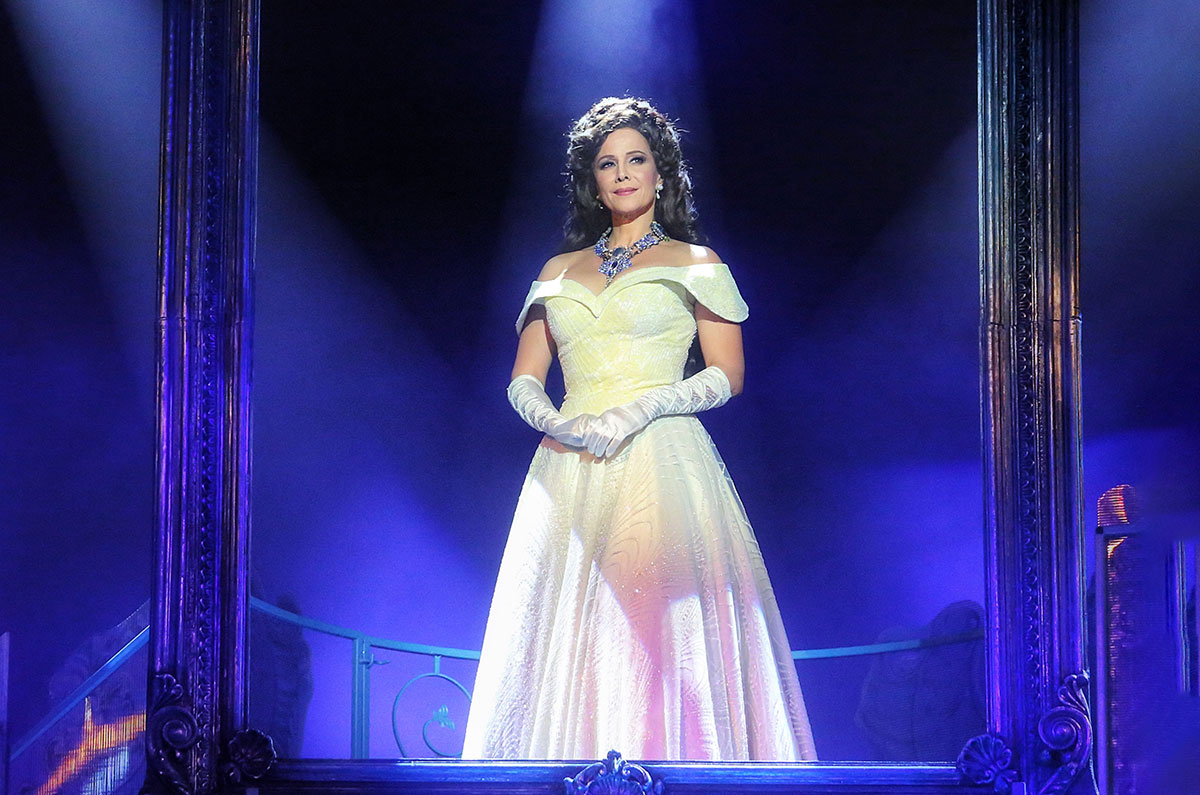
Location
- Margaret Island’s Open-Air Theater
More Info
-
Description
ELISABETH
musical by Michael Kunze and Sylvester Levay
Friday, 22 July 2022 at 8 p.m. (rain date: 24 July)
Margaret Island Open-Air Stage
script and lyrics by Michael Kunze
music and orchestration by Sylvester Levay
translated Péter Müller Sziámi
The young Sisi's desire for freedom is insatiable. At a ball, her mother announces that her eldest daughter is destined to marry Franz Joseph. The announcement is interrupted by Elisabeth's unfortunate accident. The meeting between the unconscious girl and Death changes both their fates. Unable to take her with him, the otherworldly being becomes engaged to her forever. The young Franz Joseph inescapably falls madly in love with the unruly Sisi, and he marries her against his mother's wishes. Throughout Sisi’s troubled life, happiness is a rare visitor; her loneliness is soothed by the only friend she can always count on: Death, whom she asks beside the coffin of her beloved son to take her life at last, but in vain. Eventually, the murder weapon falls into the hands of an Italian anarchist, so Elisabeth can find solace in the arms of her longed-for lover. This musical – in which Death takes the leading role – is inspired by poems written by the real-life Sisi. It is considered one of the most popular musical theatre pieces, performed since 1992 with uninterrupted success.
Original production by Vereinigte Bühnen of Vienna
Worldwide stage rights: VBW International GmbH
Linke Wienzeile 6, 1060 Vienna, Austria
international@vbw.at
Hungarian rights holder: Pentaton Artists and Concert Agency www.pentaton.hu
ELISABETH
Musical by Michael Kunze and Sylvester Levay

Location
- Margaret Island’s Open-Air Theater
More Info
-
Description
ELISABETH
musical by Michael Kunze and Sylvester Levay
Friday, 23 July 2022 at 8 p.m. (rain date: 25 July)
Margaret Island Open-Air Stage
script and lyrics by Michael Kunze
music and orchestration by Sylvester Levay
translated Péter Müller Sziámi
The young Sisi's desire for freedom is insatiable. At a ball, her mother announces that her eldest daughter is destined to marry Franz Joseph. The announcement is interrupted by Elisabeth's unfortunate accident. The meeting between the unconscious girl and Death changes both their fates. Unable to take her with him, the otherworldly being becomes engaged to her forever. The young Franz Joseph inescapably falls madly in love with the unruly Sisi, and he marries her against his mother's wishes. Throughout Sisi’s troubled life, happiness is a rare visitor; her loneliness is soothed by the only friend she can always count on: Death, whom she asks beside the coffin of her beloved son to take her life at last, but in vain. Eventually, the murder weapon falls into the hands of an Italian anarchist, so Elisabeth can find solace in the arms of her longed-for lover. This musical – in which Death takes the leading role – is inspired by poems written by the real-life Sisi. It is considered one of the most popular musical theatre pieces, performed since 1992 with uninterrupted success.
Original production by Vereinigte Bühnen of Vienna
Worldwide stage rights: VBW International GmbH
Linke Wienzeile 6, 1060 Vienna, Austria
international@vbw.at
Hungarian rights holder: Pentaton Artists and Concert Agency www.pentaton.hu
LÁSZLÓ DÉS CONCERT
So five!

Location
- Margaret Island’s Open-Air Theater
More Info
MAGNA CUM LAUDE
concert
feat:
János James Karácsony
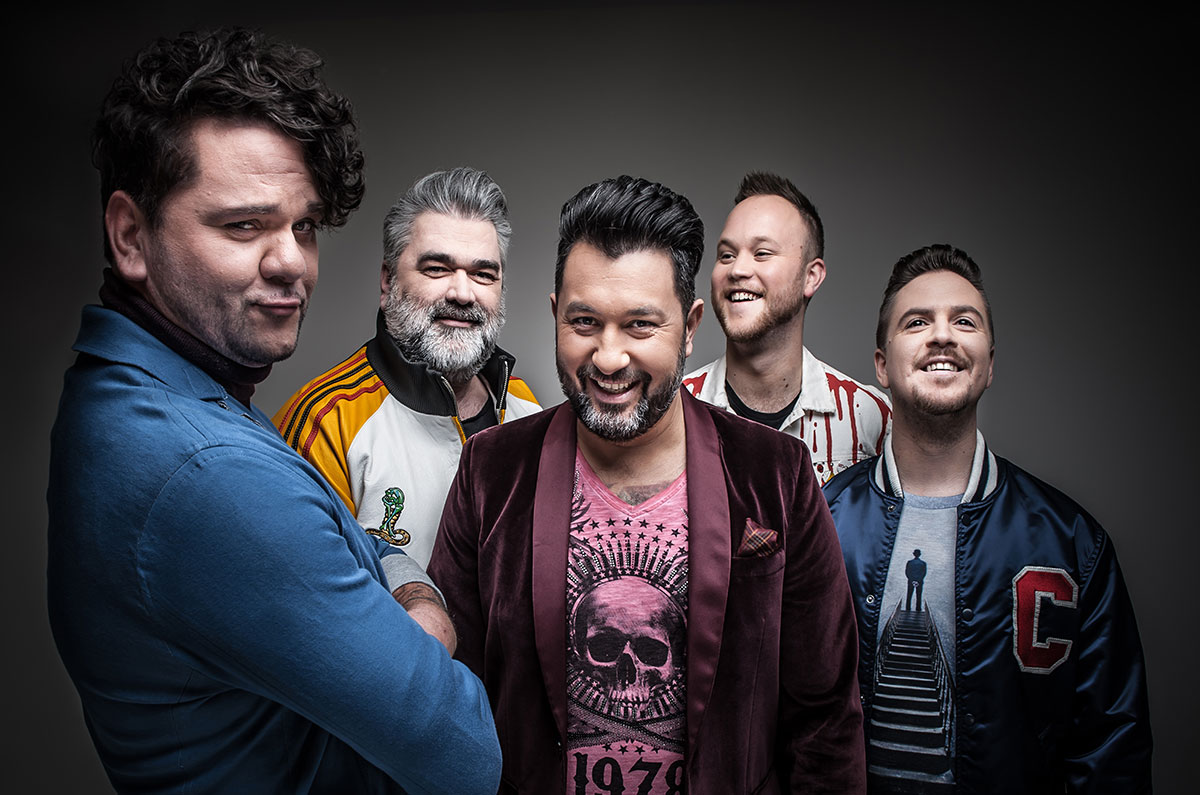
Location
- Margaret Island’s Open-Air Theater
More Info
AIDA GARIFULLINA
opera gala
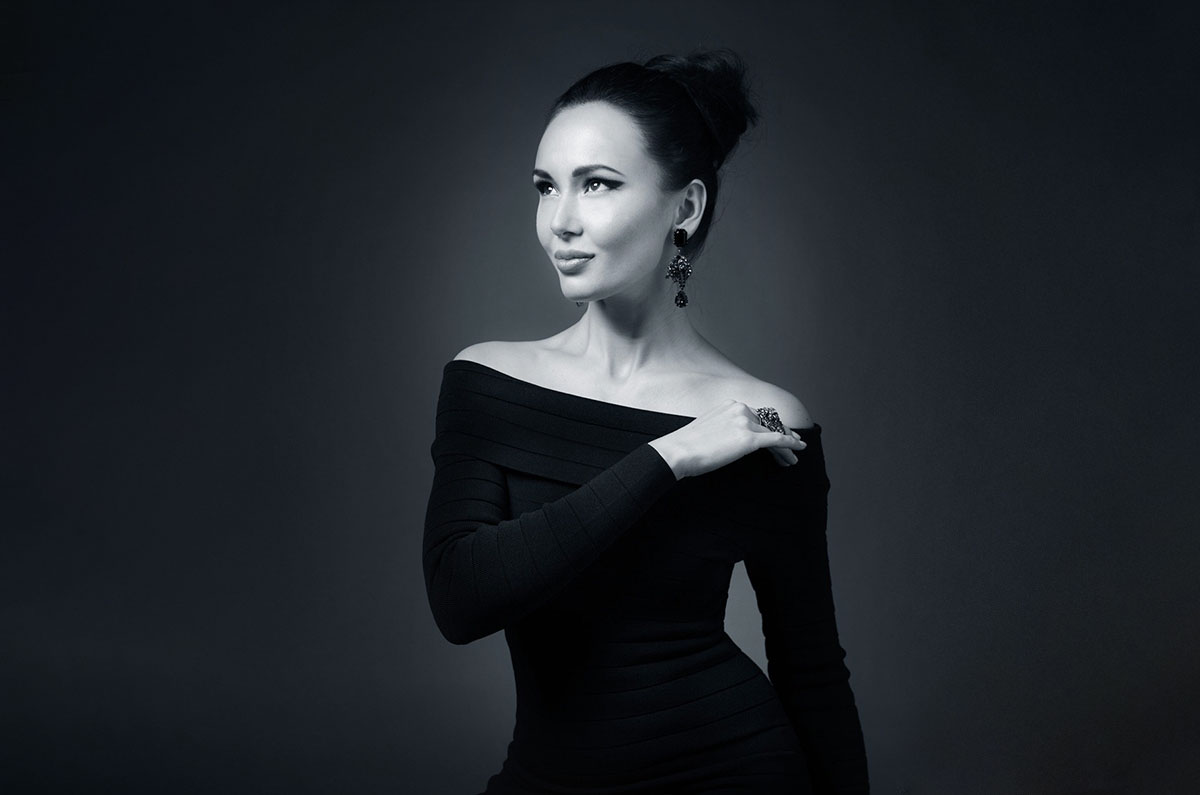
Location
- Margaret Island’s Open-Air Theater
More Info
-
Description
-
Programme
-
Aida Garifullina
-
Pier Giorgio Morandi Conductor
AIDA GARIFULLINA
Opera gala
2 August 2022 at 8 p.m. (rain date: 3 August)
Margaret Island Open-Air Stage
Featuring the Hungarian State Opera House’s orchestra
Conductor: Pier Giorgio Morandi
Every summer we welcome opera lovers with a special Opera Gala on Margaret Island. The gala’s specialty is that every year we invite renowned international stars, who, with their presence, voices, and talent, make the evening even more memorable.
The star guest of the 2022 Gala will be the beautiful soprano Aida Garifullina, who is known simply as "the songbird from Kazan with the world at her feet". Her voice has unmistakable depth, warmth, and tenderness. Her taste, style, restraint, and sensitivity, combined with her natural beauty, make her one of the most charming figures in opera.
Aida Garifullina is a celebrated artist in the midst of an internationally acclaimed career. She is a regular guest artist of the world’s leading opera houses and concert venues, including the Royal Opera House (London), La Scala (Milan), the Metropolitan Opera (New York), Paris National Opera, Arena di Verona (Italy) and Salzburg Festival.
“Aida is one of the most exciting opera divas of today and tomorrow.”
– Placido Domingo
Prior to her Budapest appearance, she will appear in Rigoletto in Florence, in L’elisir d’amore in Milan, Turandot in Berlin, and La Bohème in Munich at a Gala concert with Juan Diego Florez in Lisbon.
For Hungarian audiences, she will perform the most beautiful arias by Puccini, Verdi, Gounod, Bellini.
First Part
- Orchestra: Vincenzo Bellini, Norma - “Sinfonia”
- Aida Garifullina: Charles Gounod, - aria of Juliette “Je veux vivre”
- Orchestra: Georges Bizet - Carmen “Preludio I atto”
- Szabolcs Brickner: George Bizet, Carmen “The Flower”
- Aida Garifullina: Vincenzo Bellini, Norma - “Casta diva”
- Orchestra: Giacomo Puccini, Manon Lescaut “Intermezzo”
- Aida Garifullina: Giacomo Puccini, Boheme - “Quando m'en vo’ ”
- Duetto - Garifullina-Brickner: La Boheme: O soave fanciulla”
- Aida Garifullina: Leo Delibes “Les filles de Cádiz “
Second Part
- Orchestra: G.Verdi “La forza del Destino” Sinfonia
- Aida Garifullina: Franz Schubert - “Ave Maria”
- Orchestra: Giuseppe Verdi - Traviata “Preludio 3 Atto”
- Duetto - Garifullina-Brickner: G.Verdi, Traviata “Parigi o Cara”
- Orchestra: G.Rossini “Il Barbiere di Siviglia” Sinfonia
- Aida Garifullina: G.Gimenez: El Barbero de Sevilla - “Me llaman la primorosa”
- Orchestra: Pietro Mascagni, Cavalleria Rusticana-intermezzo
- Aida Garifullina: Dvorák: Song to the Moon
- Aida Garifullina: Ruggero Leoncavallo - “Mattinata”
Encore
- Duetto - Garifullina- Brickner: Brindisi Traviata, “Libiamo”
- Aida Garifullina: Giacomo Puccini - “O mio babbino caro”
Born in 1987 in Kazan, Republic of Tatarstan, Aida Garifullina was surrounded by music from an early age. Her first lessons in music came from her choirmaster and pianist mother who encouraged in her a love and devotion to singing. The work with her mother led her to further her musical development from early childhood and, later, inspiring a passion to pursue a career in opera.
Following initial studies in Nuremberg, Germany and The University of Music and Performing Arts in Vienna, Austria, Aida achieved huge recognition at Placido Domingo’s 2013 Operalia Competition, winning First Prize. She later joined the ensemble of the revered Vienna Staatsoper, regularly performing there whilst continuing to further her international career.
On the operatic stage she has sung under the musical guidance of some of the most prominent conductors, including Gustavo Dudamel, Zubin Mehta, Kent Nagano, Antonio Pappano, Yannick Nezet-Seguin and Placido Domingo.
Alongside a successful operatic career, Aida is a celebrated recording artist. Her acclaimed solo album “AIDA”, with Decca Records, won Best Solo Album of the year (ECHO).
“Soprano Aida Garifullina shows she has a fine future ahead of her with this excellent debut album featuring an alluring combination of arias”
– Daily Mail
As a guest singer on Andrea Bocelli’s Album “Si”, she joined artists such as Dua Lipa, Ed Sheeran and The Weekend. The album topped both the US and U.K. charts, and Aida joined Andrea Bocelli for a US tour – performing at Madison Square Garden in NYC, MGM Las Vegas and Verizon Centre in Washington, DC.
“…Garifullina is equally talented and beautiful, and commanded the stage with her vocals and looks…”
– Las Vegas Sun
In 2018, Aida performed alongside Robbie Williams at both the opening and closing ceremonies of the FIFA World Cup, with over one billion people watching live. She appeared as the guest soloist at the 2018 BBC Proms in Hyde Park, London, and the Bastille Day Concert in Paris – both to vast international audiences – alongside several highly acclaimed international recitals worldwide.
“Aida Garifullina made an auspicious house debut, gamely removing her drawers during ‘Quando m’en vo’, but finding humane dignity over Mimi’s deathbed.”
-The Telegraph
In 2019, Aida was a guest soloist in Carl Orff’s “Carmina Burana” at the Forbidden City in Beijing, China – as part of the Deutsche Grammophone 120th Anniversary Celebrations. The event was broadcast worldwide, and later released on DVD.
An opportunity to combine two of her greatest passions – Opera and Film – Aida appeared on the big screen as opera singer Lily Pons in the Oscar nominated movie “Florence Foster Jenkins” directed by Steven Frears, featuring Meryl Streep and Hugh Grant.
“Filming ‘Florence Foster Jenkins’ made me as excited and nervous as performing in any opera,” says Garifullina. “It was my first time in a feature film, and I had the wonderful Stephen Frears directing me and Meryl Streep and Hugh Grant in the audience – no pressure! And then it was all done in one take, live to camera. I could hardly believe it was all over so quickly but the result looks and sounds amazing.”
– The Guardian
She was also an invited guest of Good Morning America in December 2019, following her successful Metropolitan Opera Debut. In the same year, she was invited by Alibaba /Jack Ma to perform at his annual Gala Event, alongside Taylor Swift and Lang Lang at the Mercedes Benz Arena in Shanghai.
In 2019, Aida performed a solo concert for the official inauguration of the “One Shenzhen Bay” concert hall in the Chinese city of Shenzhen – located on the 72nd floor of the highest skyscraper in the complex. On that same evening, the tower was given the title of “The Highest Concert Hall in the World” in the Guinness Book of world records.
2019 brought several further landmark events for Aida, as she gave her Argentinian debut with a solo concert at one of the world’s most beautiful Opera houses – the renowned Teatro Colon in Buenos Aires. The journey was supported, and filmed, by a German Film Production company, who made a documentary of the events surrounding the performance.
“Aida is fearless. She got to the point where the high notes just bloom.”
– The New York Times
During 2020, Aida was honored to receive an audience with Pope Francis, later singing at annual charitable concert of the Vatican – “Concerto di Natale”. The concert raised funds to support children in need in Africa and was broadcast live on Christmas Eve.
The next stop was the legendary, historical theatre – La Scala, Milan – where Aida appeared as soloist in a Christmas concert, performing Mozart’s “Exsultate, Jubilate”.
In 2021, Aida was named by GQ magazine as Super Woman of the Year in Culture.
With a strong desire to help those around her, Aida is on the board of several charitable foundations and involved with many humanitarian projects. She sings regularly in support of many foundations, including the David Foster Foundation, Andrea Bocelli and Mohammed Ali’s “Celebrity Fight Night” and many more.
Aida is in high demand both on the international operatic stage and concert platform and is currently working with her team on several large-scale music projects, to officially be announced in the near future.
Aida Garifullina appears by arrangement with Askonas Holt.
Pier Giorgio Morandi
Conductor
Pier Giorgio Morandi played for ten years as principal oboist in Orchestra del Teatro alla Scala in Milan. He studied composition at Conservatorio G. Verdi in Milan, and orchestra conducting at Salzburg Mozarteum with M° Ferdinand Leitner. During the years spent at La Scala, Morandi was assistant conductor of M° Riccardo Muti and later of M° Giuseppe Patanè, from whom he gained a lot of experience in refining the stylistic Italian repertoire and in learning all the secrets of the Italian operatic tradition.
In 1987 he studied in Tanglewood, USA, with M° Leonard Bernstein and M° Seiji Ozawa. In the same year, Morandi won the "Tanglewood Competition", also known as "Bernstein Prize". In 1989 he became Deputy Principal Conductor at Teatro dell'Opera in Rome, where he conducted Ernani, Madama Butterfly and several symphonic concerts. In 1990 he recorded his first opera with Roma opera house, Paisiello’s Don Chisciotte. From 1991 and for the following five years, he was Principal Guest Conductor at Budapest National Opera House.
Morandi has a wide Italian operatic repertoire and he has been working as regular guest conductor since 1990 in all the major opera houses in Italy, Europe and worldwide: Palermo, Trieste, Roma, Marseille, La Maestranza in Seville, Bunka Kaikan in Tokyo, Osaka, National Opera Theatre in Seoul, Colon in Buenos Aires, Stockholm Royal Opera House, Theatre Royal de La Monnaie in Brussels, Deutsche Oper Berlin, Oper Frankfurt, Wiener Staatsoper, Macerata Opera Festival, Arena di Verona, Opernhaus Zürich, Goteborg, Teatro Regio di Parma, Napoli, Puccini Festival in Torre del Lago, Bilbao, Maiorca, Las Palmas, Valencia, Copenhagen Royal Opera House, Seattle Opera, Royal Albert Hall in London.
An appreciated interpreter of symphonic repertoire, Morandi has worked, among others, with Budapest Radio Orchestra, Budapest Philharmonic Orchestra, Budapest State Orchestra, Flamish Radio Orchestra, Roma’s Santa Cecilia Symphony Orchestra, Orchestra del Filarmonico di Verona, Sanremo Symphony Orchestra, Reggio Calabria Symphony Orchestra, Fukuoka Philharmonic Orchestra, Tokyo Philharmonic Orchestra, Osaka Philharmonic Orchestra, Helsingborg Symphony Orchestra.
A prolific recording artist, Morandi appeared in several releases, including the Verdi Gala DVD with tenor José Cura and the London Symphony Orchestra, and two Sony Classic CD’s of the European tour with tenor Vittorio Grigolo.
Recent seasons’ highlights include La Fanciulla del West, Tosca and Un Ballo in Maschera at Stockholm Royal Opera House (where he held the position of Principal Guest Conductor), Aida in Oslo and in Qatar, L’Elisir d’Amore, La Bohème and Don Carlo in Dresden, Maria Stuarda in Frankfurt, Macbeth at La Scala, Attila at the Palace of Arts in Budapest, Rigoletto in Naples, a symphonic concert at Musikverein in Graz.
Most recently, Don Carlo, Aida and Lucia di Lammermoor at La Scala, Otello in Copenhagen, Madama Butterfly in Oslo, Manon Lescaut, Rigoletto, Turandot, Madama Butterfly, La Bohème and La Traviata in Dresden, La Fanciulla del West in Frankfurt, Otello and L’elisir d’amore at the China National Center of Performing arts in Bejing, Manon Lescaut at the New National Theatre in Tokyo, Rigoletto at Opéra Bastille, Il Barbiere di Siviglia at the China National Center of Performing arts, Rigoletto and Madame Butterfly at Metropolitan Opera, Rigoletto al Metropolitan Opera, Lucia di Lammermoor and Don Carlo in Hamburg, Turandot at Sferisterio Opera Festival, Aida at Opera Australia, Madame Butterfly at Teatro Regio di Torino.
He was Principal Guest Conductor at Helsingborg Symphony Orchestra and at Royal Opera House in Stockholm.
His future plans include: Turandot at Spring Festival in Tokyo (concert form), La Forza del destino and Il Trittico at Oper Frankfurt.
Giuseppe Verdi: ATTILA
Semi-staged opera
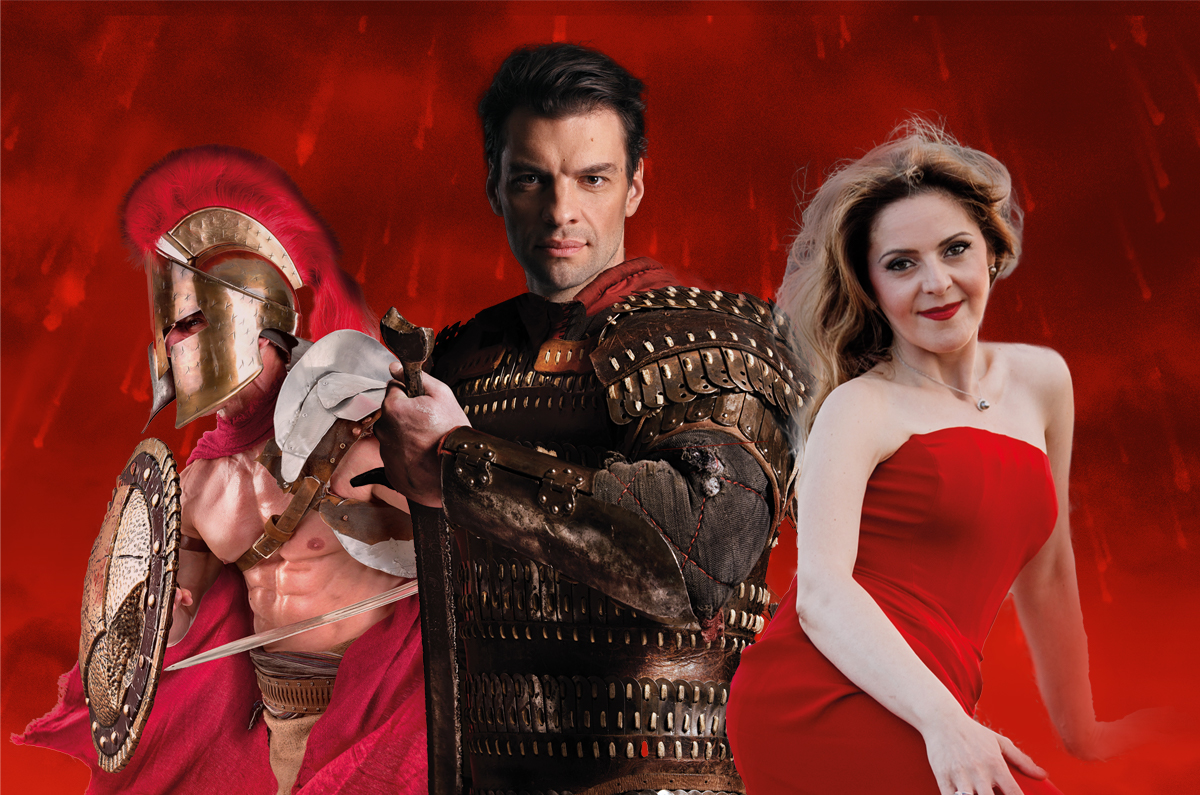
Location
- Margaret Island’s Open-Air Theater
More Info
-
Description
-
Synopsis
-
Gábor Bretz
-
Maria Agresta
Giuseppe Verdi:
ATTILA
Semi-staged opera
12 August 2022 at 8 p.m. (rain date: 13 August)
Margaret Island Open-Air Stage
Conductor: István Dénes
Featuring the Hungarian State Opera House’s orchestra and chorus
Giuseppe Verdi, the most brilliant of Italian opera's masters, created a fiery, dynamic, complex, and distinct work of art, inspired by Attila the Hun, “the scourge of God”, the most famous of the European Huns’ grand kings. The work’s libretto was written in part by both Temistocle Solera and Francesco Maria Piave. The story is based on Zacharias Werner's 1809 drama Attila, King of the Huns. From the Paris Opera to the Metropolitan, this opera is performed all over the world.
The first performance took place on 17 March 1846, at La Fenice Opera House in Venice. It was first performed in Hungary on 7 July 1972, on the Margaret Island Open-Air Stage. The title role was sung by József Gregor, and the role of Odabella was sung by Éva Marton. The production was directed by Gian Carlo del Monaco and conducted by Lamberto Gardelli.
Now fifty years later, the story of the King of the Huns will be revived on Margaret Island this summer with star vocalists and a unique and stunning spectacle. Attila is an authentic work – fiery, passionate, and rebellious – defying everyday expression and conventional forms.
At the Margaret Island Theater in 2022, the title role will be sung by Gábor Bretz on the world-famous bass baritone, who will make his debut in this role. In 2022, the lead female role of Odabella will be sung by none other than the world-famous Italian soprano Maria Agresta. She is a regular partner of world-renown superstars such as Placido Domingo, Jonas Kaufmann, Francesco Meli, and Ludovic Tézier. As the daughter of the fallen ruler of Aquileia, the soprano playing Odabella is immediately smitten with Attila and gives him her sword in recognition of his bravery.
The director of the performance is András Aczél, who has had many successes on Hungarian opera stages. The costumes and sets are made by Kentaur, who has gained international acclaim for his musical theatrical work. The visual and light designs were made by János Madarász, an expert in this field, and the choreography is the work of János Feledi, one of the well-known choreographers of contemporary Hungarian dance.
Prologue
Scene 1: The ruined city of Aquileia
Attila and his victorious horde are surprised to see a group of women spared as prisoners of war. Their leader, Odabella, asks why the Huns' women remain at home (Allor che i forti corrono / "While your warriors rush to their swords like lions"). Attila, impressed by her courage, offers a boon and she asks for her sword to avenge the death of her father at Attila's own hand (Da te questo or me concesso / "O sublime, divine justice by thee is this now granted"). The Roman envoy Ezio asks for an audience and proposes a division of the empire: Avrai tu l'universo, Resti l'Italia a me / "You may have the universe, but let Italy remain mine". Attila denounces him as a traitor to his country.
Scene 2: A swamp, the future site of Venice
A boat bearing Foresto and other survivors arrives; he thinks of the captive Odabella (Ella in poter del barbaro / "She is in the barbarian's power!") but then rouses himself and the others to begin building a new city (Cara patria giа madre e reina / "Dear homeland, at once mother and queen of powerful, generous sons").
Act 1
Scene 1: A wood near Attila's camp
Odabella laments her father and Foresto (Oh! Nel fuggente nuvolo / "O father, is your image not imprinted on the fleeting clouds?") believing the latter to be dead. When he appears, she is put on the defensive, denying any infidelity, and reminding him of the biblical Judith. The couple is reunited: Oh, t'inebria nell'amplesso / "O vast joy without measure")
Scene 2: Attila's tent
Attila awakes and tells Uldino of a dream in which an old man stopped him at the gates of Rome and warned him to turn back (Mentre gonfiarsi l'anima parea / "As my soul seemed to swell"). In the daylight, his courage returns, and he orders a march (Oltre quel limite, t'attendo, o spettro / "Beyond that boundary I await you, O ghost!"). However, when a procession of maidens clads in white approaches, singing a Christian hymn, he recognizes the Roman bishop Leo as the old man of his dream, and collapses in terror.
Act 2
Ezio's camp
Ezio has been recalled, after a peace has been concluded. He contrasts Rome's past glory with the child emperor Valentine (Dagl'immortali vertici / "From the splendid immortal peaks of former glory"). Recognizing the incognito Foresto among the bearers of an invitation to a banquet with Attila, he agrees to join forces (E' gettata la mia sorte / "My lot is cast, I am prepared for any warfare" ). At the banquet, Foresto's plot to have Uldino poison Attila is foiled by Odabella, jealous of her own revenge. A grateful (and unsuspecting) Attila declares she shall be his wife, and places the unmasked Foresto in her custody.
Act 3
The forest
Uldino informs Foresto about the plans for the wedding of Odabella and Attila; Foresto laments Odabella's apparent betrayal (Che non avrebbe il misero / "What would that wretched man not have offered for Odabella). Ezio arrives with a plan to ambush the Huns; when Odabella comes Foresto accuses her of treachery, but she pleads for his trust. Attila finds the three and recognizes their betrayal. As Roman soldiers approach, Odabella stabs him with the sword he had given her. The three conspirators cry that the people have been avenged.
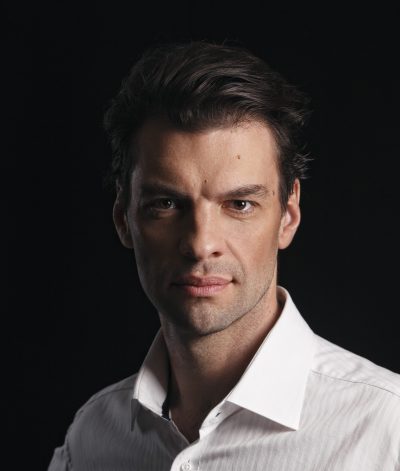 opera singer, Chamber Singer of the Hungarian State Opera (2012/2013)
opera singer, Chamber Singer of the Hungarian State Opera (2012/2013)
bass-baritone
Born in Budapest, Gábor Bretz, studied with Stephen Czovek in Los Angeles before returning to Budapest to continue his training first with Professor Albert Antalffy, then at the Béla Bartók High School of Music with Mária Fekete, and later with Erika Sziklai and Sándor Sólyom-Nagy at the Ferenc Liszt Academy of Music. Gábor has also attended master classes with Julia Hamari, Ralf Doring, Eva Marton and Yevgeni Nesterenko.
He has made his debut at a number of operatic venues abroad, including the title role Der fliegende Holländer at the Passionstheater; Ferrando Il Trovatore at the Royal Opera House. Escamillo/Zuniga Carmen under Gustavo Dudamel at the Teatro alla Scala in Milan, and at the Bayerische Staatsoper, the Royal Opera House, the Metropolitan Opera New York, the New National Theatre in Tokyo and the Hamburg State Opera and for the Leipzig Opera.
He sang Sparafucile in Rigoletto for the Vienna Festwochen at the Theater an der Wien, and in Klagenfurt and in numerous performances in the title role of Bluebeard’s Castle with The Berlin Philharmonic, with Helsinki Philharmonic Orchestra, the Oregon Symphony Orchestra, the London Symphony Orchestra, the Bayerische Rundfunk Orchestra, with the New York Philharmonic at Alice Tully Hall and under Gergiev in Ekaterinburg and Moscow.
His others Scala credits are: First Soldier Salome, Bluebeard Bluebeard’s Castle, the Monk Don Carlo, and Don Basilio Il Barbiere di Siviglia .
His other operatic performances include Antonio Le Nozze di Figaro at the Salzburg Festival, Masetto Don Giovanni at the Komische Oper, Berlin, the title-role in Don Giovanni with Opera Zagreb, and for Opera Australia, the High Priest of Babylon Nabucco for Opéra de Rennes.
He also sang Seneca in L’incoronazione di Poppea in Klagenfurt, Colline in La Bohème at the Royal Opera House; Shaklovity in Khovanshchina at Dutch National Opera; Phillipe II in Don Carlos at the Hamburg State Opera, in a Peter Konwitschny production; Scarpia in Tosca at the Teatro Comunale di Bologna; a staged Verdi Requiem at the Hamburg State Opera; King Heinrich in Lohengrin at La Monnaie, Brussels; Jochanaan in Salome at the Salzburg Festival .
He worked with Maestro Daniel Barenboim, Gustavo Dudamel, Adam Fischer, Ed Gardner, Daniele Gatti, Valery Gergiev, Daniel Harding, Michele Mariotti and Esa-Pekka Salonen. Gábor Bretz has also worked with other eminent conductors including Alain Altinoglu, Philippe Jordan, Kent Nagano, Simon Rattle, Juraj Valčuha and Omer Meir Wellber.
Since graduating from the Franz Liszt Academy of Music in Budapest, Gábor Bretz’s regular performances at the Hungarian State Opera have included the title-roles in Mefistofele and Le Nozze di Figaro, Leporello and the title-role in Don Giovanni, Banquo Macbeth, Colline La Bohème, Don Basilio Il Barbiere di Siviglia, Escamillo Carmen, Gurnemanz Parsifal, Zaccaria Nabucco, Orestes Elektra, Marcel Les Huguenots, Fiesco Simon Boccanegra and Pogner Die Meistersinger von Nürnberg, in addition to Landgraf Tannhauser at the Wagner Festival under Adam Fischer and for the Palace of Arts in Budapest.
He was appointed Chamber Singer of the Hungarian State Opera for the 2012/13 season.
In addition to his operatic appearances Gábor Bretz sings regularly in concert, and his repertoire includes the major oratorios of Bach, Haydn, Mozart (including the Coronation Mass under Helmut Rilling), Rossini, Puccini, Beethoven’s Symphony No. 9, Tippett’s A Child of our Time, Berlioz’s L’Enfance du Christ (under Sylvain Cambreling), and the Verdi Requiem in Budapest with the National Philharmonic under the baton of Zoltan Kocsis.
Awards and recognitions:
Mihály Székely Commemorative Plaque (2022)
Hungarian Artist of Merit (2020)
Ferenc Liszt Award (2013)
Chamber Singer of the Hungarian State Opera (2012/2013)
The top prize at the International Maria Callas Grand Prix in Athens. (2005)
The Cesare Bardelli prize at the Viotti International Singing Competition. (2004)
Maria Agresta
Soprano
Winner of several music competitions, she made her debut in 2007.
Her success came after a few years, in 2011, when she performed I Vespri Siciliani at Teatro Regio in Turin conducted by Gianandrea Noseda, with great reviews from public and critics. Since then, she has been invited to sing on the most important stages worldwide.
Highlights include Norma in Tel Aviv, La Bohème (Mimì) at Arena di Verona, in Munich, at San Carlo in Naples, at Teatro Regio in Turin and at Festival Puccini in Torre del Lago, Gemma di Vergy at Teatro Donizetti in Bergamo, Elvira in Don Giovanni at La Scala.
She then sang Il Trovatore in Valencia conduted by M° Zubin Mehta, Carmen in Masada and La Traviata at Berlin Staatsoper.
In 2012 she returned to La Scala with La Bohème, where she obtained a big personal success.
She was higly praised for her performance in the concert version of Giovanna d’Arco at Musikverein in Graz with ORT and she sang Simon Boccanegra in Rome with M° Muti, I Masnadieri and La Bohème in Venice, Verdi’s Messa da Requiem at San Carlo in Naples with M° Luisotti and at Staatsoper in Berlin conducted by M° Baremboim, Oberto Conte di San Bonifacio at La Scala, Otello in Valencia with M° Mehta, La Vestale in Dresden.
She performed La Traviata at Arena di Verona and in Guangzhou, Otello in Zurich and Genoa, a new production of I Puritani at Opéra Bastille in Paris, Il Trovatore at La Scala, La Bohème in Tel Aviv and at Opéra Bastille, Simon Boccanegra (new production) in Dresden conducted by M° Thielemann, the debut at the Royal Opera House, with I due Foscari, conducted by Antonio Pappano.
Maria sang Norma in Zurich conducted by M° Luisi, Turandot at La Scala conducted by M° Riccardo Chailly, Norma in Turin and at the Champs Elysées , Verdi’s Requiem at La Scala under the baton of M° Mehta, La Traviata in Munich, Norma and Il Trovatore in Madrid, her debut at Metropolitan Opera in La Bohème, directed by Zeffirelli, where she came back with Turandot, Turandot at Lyric Opera in Chicago.
Recently she made her debut in Don Carlo at Teatro Real de Madrid, which she sang also in Venice at Teatro La Fenice.
Another debut is in Tosca at Opéra de Paris and Teatro Real de Madrid.
Future engagements include: Otello at San Carlo di Napoli, her upcoming debut in Adriana Lecouvreur at Teatro La Scala, Manon Lescaut at Opéra de Montecarlo.
Maria has won the important prize “Franco Abbiati” in 2014: Italian national critics gave her the prize for Best Soprano.
Besides, she won the prestigious international prize "Luigi Illica".
Giuseppe Verdi: ATTILA
Semi-staged opera

Location
- Margaret Island’s Open-Air Theater
More Info
-
Description
-
Synopsis
-
Gábor Bretz
-
Maria Agresta
Giuseppe Verdi:
ATTILA
Semi-staged opera
14 August 2022 at 8 p.m. (rain date: 15 August)
Margaret Island Open-Air Stage
Conductor: István Dénes
Featuring the Hungarian State Opera House’s orchestra and chorus
Giuseppe Verdi, the most brilliant of Italian opera's masters, created a fiery, dynamic, complex, and distinct work of art, inspired by Attila the Hun, “the scourge of God”, the most famous of the European Huns’ grand kings. The work’s libretto was written in part by both Temistocle Solera and Francesco Maria Piave. The story is based on Zacharias Werner's 1809 drama Attila, King of the Huns. From the Paris Opera to the Metropolitan, this opera is performed all over the world.
The first performance took place on 17 March 1846, at La Fenice Opera House in Venice. It was first performed in Hungary on 7 July 1972, on the Margaret Island Open-Air Stage. The title role was sung by József Gregor, and the role of Odabella was sung by Éva Marton. The production was directed by Gian Carlo del Monaco and conducted by Lamberto Gardelli.
Now fifty years later, the story of the King of the Huns will be revived on Margaret Island this summer with star vocalists and a unique and stunning spectacle. Attila is an authentic work – fiery, passionate, and rebellious – defying everyday expression and conventional forms.
At the Margaret Island Theater in 2022, the title role will be sung by Gábor Bretz on the world-famous bass baritone, who will make his debut in this role. In 2022, the lead female role of Odabella will be sung by none other than the world-famous Italian soprano Maria Agresta. She is a regular partner of world-renown superstars such as Placido Domingo, Jonas Kaufmann, Francesco Meli, and Ludovic Tézier. As the daughter of the fallen ruler of Aquileia, the soprano playing Odabella is immediately smitten with Attila and gives him her sword in recognition of his bravery.
The director of the performance is András Aczél, who has had many successes on Hungarian opera stages. The costumes and sets are made by Kentaur, who has gained international acclaim for his musical theatrical work. The visual and light designs were made by János Madarász, an expert in this field, and the choreography is the work of János Feledi, one of the well-known choreographers of contemporary Hungarian dance.
Prologue
Scene 1: The ruined city of Aquileia
Attila and his victorious horde are surprised to see a group of women spared as prisoners of war. Their leader, Odabella, asks why the Huns' women remain at home (Allor che i forti corrono / "While your warriors rush to their swords like lions"). Attila, impressed by her courage, offers a boon and she asks for her sword to avenge the death of her father at Attila's own hand (Da te questo or me concesso / "O sublime, divine justice by thee is this now granted"). The Roman envoy Ezio asks for an audience and proposes a division of the empire: Avrai tu l'universo, Resti l'Italia a me / "You may have the universe, but let Italy remain mine". Attila denounces him as a traitor to his country.
Scene 2: A swamp, the future site of Venice
A boat bearing Foresto and other survivors arrives; he thinks of the captive Odabella (Ella in poter del barbaro / "She is in the barbarian's power!") but then rouses himself and the others to begin building a new city (Cara patria giа madre e reina / "Dear homeland, at once mother and queen of powerful, generous sons").
Act 1
Scene 1: A wood near Attila's camp
Odabella laments her father and Foresto (Oh! Nel fuggente nuvolo / "O father, is your image not imprinted on the fleeting clouds?") believing the latter to be dead. When he appears, she is put on the defensive, denying any infidelity, and reminding him of the biblical Judith. The couple is reunited: Oh, t'inebria nell'amplesso / "O vast joy without measure")
Scene 2: Attila's tent
Attila awakes and tells Uldino of a dream in which an old man stopped him at the gates of Rome and warned him to turn back (Mentre gonfiarsi l'anima parea / "As my soul seemed to swell"). In the daylight, his courage returns, and he orders a march (Oltre quel limite, t'attendo, o spettro / "Beyond that boundary I await you, O ghost!"). However, when a procession of maidens clads in white approaches, singing a Christian hymn, he recognizes the Roman bishop Leo as the old man of his dream, and collapses in terror.
Act 2
Ezio's camp
Ezio has been recalled, after a peace has been concluded. He contrasts Rome's past glory with the child emperor Valentine (Dagl'immortali vertici / "From the splendid immortal peaks of former glory"). Recognizing the incognito Foresto among the bearers of an invitation to a banquet with Attila, he agrees to join forces (E' gettata la mia sorte / "My lot is cast, I am prepared for any warfare" ). At the banquet, Foresto's plot to have Uldino poison Attila is foiled by Odabella, jealous of her own revenge. A grateful (and unsuspecting) Attila declares she shall be his wife, and places the unmasked Foresto in her custody.
Act 3
The forest
Uldino informs Foresto about the plans for the wedding of Odabella and Attila; Foresto laments Odabella's apparent betrayal (Che non avrebbe il misero / "What would that wretched man not have offered for Odabella). Ezio arrives with a plan to ambush the Huns; when Odabella comes Foresto accuses her of treachery, but she pleads for his trust. Attila finds the three and recognizes their betrayal. As Roman soldiers approach, Odabella stabs him with the sword he had given her. The three conspirators cry that the people have been avenged.
 opera singer, Chamber Singer of the Hungarian State Opera (2012/2013)
opera singer, Chamber Singer of the Hungarian State Opera (2012/2013)
bass-baritone
Born in Budapest, Gábor Bretz, studied with Stephen Czovek in Los Angeles before returning to Budapest to continue his training first with Professor Albert Antalffy, then at the Béla Bartók High School of Music with Mária Fekete, and later with Erika Sziklai and Sándor Sólyom-Nagy at the Ferenc Liszt Academy of Music. Gábor has also attended master classes with Julia Hamari, Ralf Doring, Eva Marton and Yevgeni Nesterenko.
He has made his debut at a number of operatic venues abroad, including the title role Der fliegende Holländer at the Passionstheater; Ferrando Il Trovatore at the Royal Opera House. Escamillo/Zuniga Carmen under Gustavo Dudamel at the Teatro alla Scala in Milan, and at the Bayerische Staatsoper, the Royal Opera House, the Metropolitan Opera New York, the New National Theatre in Tokyo and the Hamburg State Opera and for the Leipzig Opera.
He sang Sparafucile in Rigoletto for the Vienna Festwochen at the Theater an der Wien, and in Klagenfurt and in numerous performances in the title role of Bluebeard’s Castle with The Berlin Philharmonic, with Helsinki Philharmonic Orchestra, the Oregon Symphony Orchestra, the London Symphony Orchestra, the Bayerische Rundfunk Orchestra, with the New York Philharmonic at Alice Tully Hall and under Gergiev in Ekaterinburg and Moscow.
His others Scala credits are: First Soldier Salome, Bluebeard Bluebeard’s Castle, the Monk Don Carlo, and Don Basilio Il Barbiere di Siviglia .
His other operatic performances include Antonio Le Nozze di Figaro at the Salzburg Festival, Masetto Don Giovanni at the Komische Oper, Berlin, the title-role in Don Giovanni with Opera Zagreb, and for Opera Australia, the High Priest of Babylon Nabucco for Opéra de Rennes.
He also sang Seneca in L’incoronazione di Poppea in Klagenfurt, Colline in La Bohème at the Royal Opera House; Shaklovity in Khovanshchina at Dutch National Opera; Phillipe II in Don Carlos at the Hamburg State Opera, in a Peter Konwitschny production; Scarpia in Tosca at the Teatro Comunale di Bologna; a staged Verdi Requiem at the Hamburg State Opera; King Heinrich in Lohengrin at La Monnaie, Brussels; Jochanaan in Salome at the Salzburg Festival .
He worked with Maestro Daniel Barenboim, Gustavo Dudamel, Adam Fischer, Ed Gardner, Daniele Gatti, Valery Gergiev, Daniel Harding, Michele Mariotti and Esa-Pekka Salonen. Gábor Bretz has also worked with other eminent conductors including Alain Altinoglu, Philippe Jordan, Kent Nagano, Simon Rattle, Juraj Valčuha and Omer Meir Wellber.
Since graduating from the Franz Liszt Academy of Music in Budapest, Gábor Bretz’s regular performances at the Hungarian State Opera have included the title-roles in Mefistofele and Le Nozze di Figaro, Leporello and the title-role in Don Giovanni, Banquo Macbeth, Colline La Bohème, Don Basilio Il Barbiere di Siviglia, Escamillo Carmen, Gurnemanz Parsifal, Zaccaria Nabucco, Orestes Elektra, Marcel Les Huguenots, Fiesco Simon Boccanegra and Pogner Die Meistersinger von Nürnberg, in addition to Landgraf Tannhauser at the Wagner Festival under Adam Fischer and for the Palace of Arts in Budapest.
He was appointed Chamber Singer of the Hungarian State Opera for the 2012/13 season.
In addition to his operatic appearances Gábor Bretz sings regularly in concert, and his repertoire includes the major oratorios of Bach, Haydn, Mozart (including the Coronation Mass under Helmut Rilling), Rossini, Puccini, Beethoven’s Symphony No. 9, Tippett’s A Child of our Time, Berlioz’s L’Enfance du Christ (under Sylvain Cambreling), and the Verdi Requiem in Budapest with the National Philharmonic under the baton of Zoltan Kocsis.
Awards and recognitions:
Mihály Székely Commemorative Plaque (2022)
Hungarian Artist of Merit (2020)
Ferenc Liszt Award (2013)
Chamber Singer of the Hungarian State Opera (2012/2013)
The top prize at the International Maria Callas Grand Prix in Athens. (2005)
The Cesare Bardelli prize at the Viotti International Singing Competition. (2004)
Maria Agresta
Soprano
Winner of several music competitions, she made her debut in 2007.
Her success came after a few years, in 2011, when she performed I Vespri Siciliani at Teatro Regio in Turin conducted by Gianandrea Noseda, with great reviews from public and critics. Since then, she has been invited to sing on the most important stages worldwide.
Highlights include Norma in Tel Aviv, La Bohème (Mimì) at Arena di Verona, in Munich, at San Carlo in Naples, at Teatro Regio in Turin and at Festival Puccini in Torre del Lago, Gemma di Vergy at Teatro Donizetti in Bergamo, Elvira in Don Giovanni at La Scala.
She then sang Il Trovatore in Valencia conduted by M° Zubin Mehta, Carmen in Masada and La Traviata at Berlin Staatsoper.
In 2012 she returned to La Scala with La Bohème, where she obtained a big personal success.
She was higly praised for her performance in the concert version of Giovanna d’Arco at Musikverein in Graz with ORT and she sang Simon Boccanegra in Rome with M° Muti, I Masnadieri and La Bohème in Venice, Verdi’s Messa da Requiem at San Carlo in Naples with M° Luisotti and at Staatsoper in Berlin conducted by M° Baremboim, Oberto Conte di San Bonifacio at La Scala, Otello in Valencia with M° Mehta, La Vestale in Dresden.
She performed La Traviata at Arena di Verona and in Guangzhou, Otello in Zurich and Genoa, a new production of I Puritani at Opéra Bastille in Paris, Il Trovatore at La Scala, La Bohème in Tel Aviv and at Opéra Bastille, Simon Boccanegra (new production) in Dresden conducted by M° Thielemann, the debut at the Royal Opera House, with I due Foscari, conducted by Antonio Pappano.
Maria sang Norma in Zurich conducted by M° Luisi, Turandot at La Scala conducted by M° Riccardo Chailly, Norma in Turin and at the Champs Elysées , Verdi’s Requiem at La Scala under the baton of M° Mehta, La Traviata in Munich, Norma and Il Trovatore in Madrid, her debut at Metropolitan Opera in La Bohème, directed by Zeffirelli, where she came back with Turandot, Turandot at Lyric Opera in Chicago.
Recently she made her debut in Don Carlo at Teatro Real de Madrid, which she sang also in Venice at Teatro La Fenice.
Another debut is in Tosca at Opéra de Paris and Teatro Real de Madrid.
Future engagements include: Otello at San Carlo di Napoli, her upcoming debut in Adriana Lecouvreur at Teatro La Scala, Manon Lescaut at Opéra de Montecarlo.
Maria has won the important prize “Franco Abbiati” in 2014: Italian national critics gave her the prize for Best Soprano.
Besides, she won the prestigious international prize "Luigi Illica".
Tamás Szarka: BLACKDOWN
record presentation

Location
- Margaret Island’s Open-Air Theater
More Info
Best of GESZTI
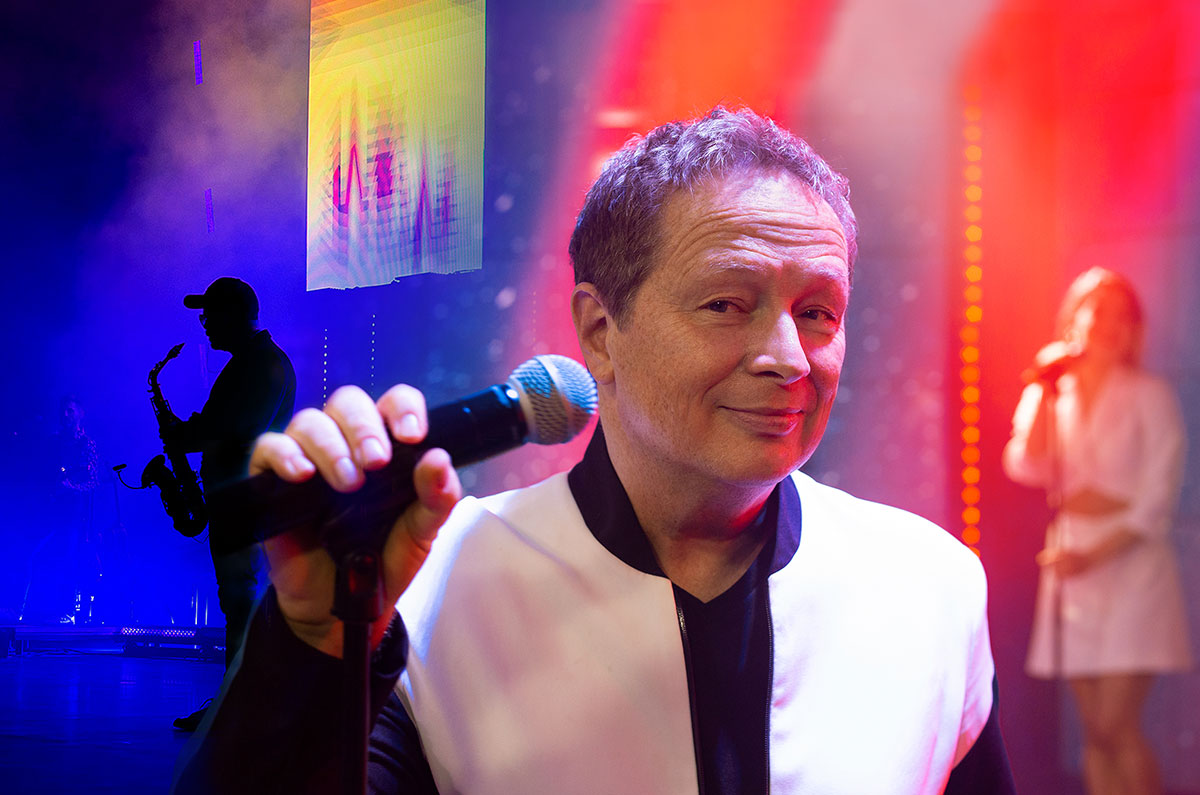
Location
- Margaret Island’s Open-Air Theater
More Info
JUBILEE
75. – 25.
MIKLÓS FENYŐ CONCERT

Location
- Margaret Island’s Open-Air Theater
More Info
Budapest Bár concert

Location
- Margaret Island’s Open-Air Theater
More Info
ONLY FROM PURE SOURCES
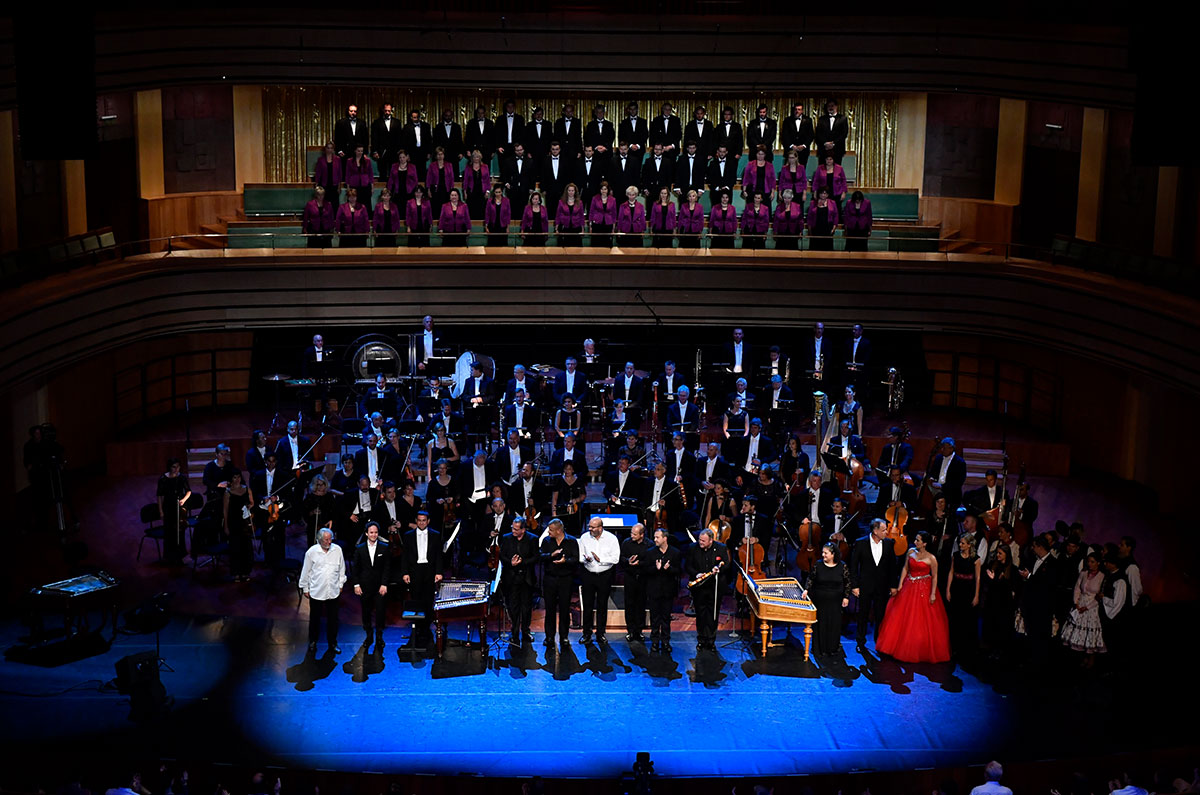
ARARAT WORSHIP COLLECTIVE

Location
- Margaret Island’s Open-Air Theater
More Info
Ballad of pears in her hair
OMEGA MUSICAL
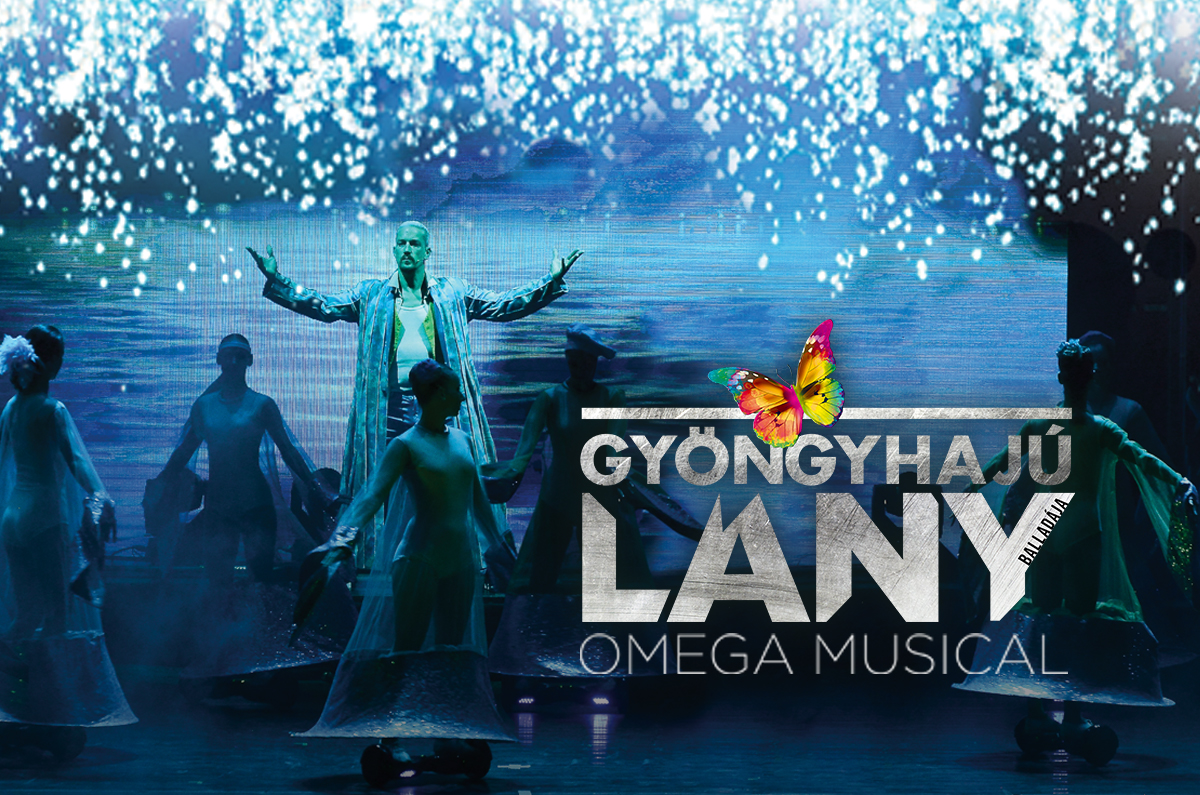
Location
- Margaret Island’s Open-Air Theater




